













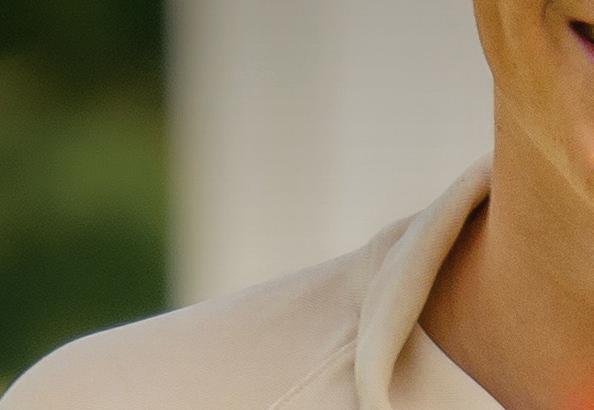













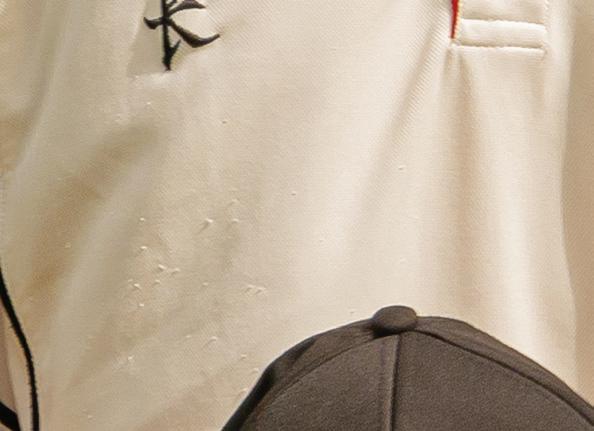














HONG KONG EDITION







FOCUS




Dauntsey’s School



LEARNING
























































































FOCUS







LEARNING
























































“ “





Every student has a place at King’s InterHigh











Develop your child's love for learning with a premium online education that's student tested and parent approved. Enrolling now









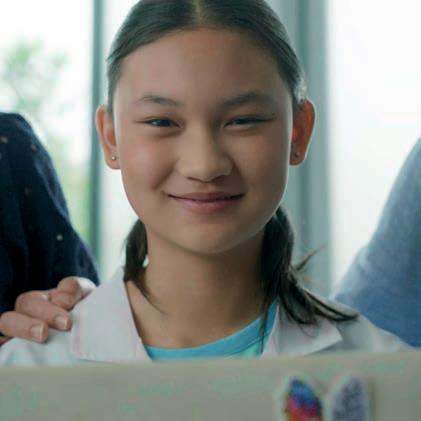


























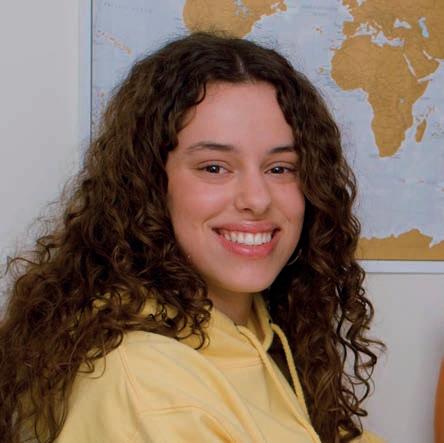



















Inspiring young minds to write their own stories.

Inspiring young minds to write their own stories.




A









Wycli e is a global community welcoming pupils aged 7-19 from around the world, allowing them to immerse themselves fully in British culture. Cultural diversity supports us in fulfilling our aims for pupils, especially to ‘Cultivate social and environmental awareness and an understanding of their role as global citizens’.






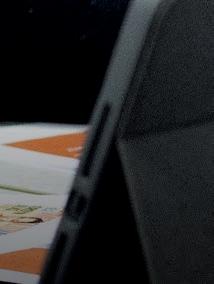

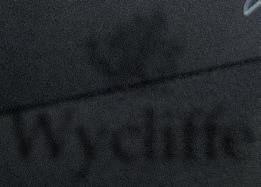




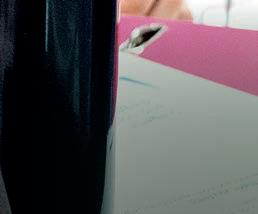







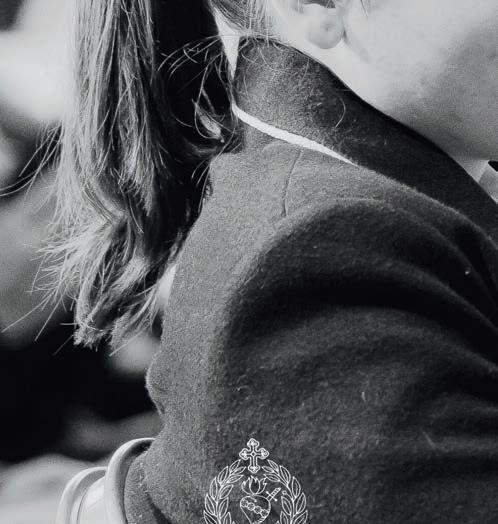
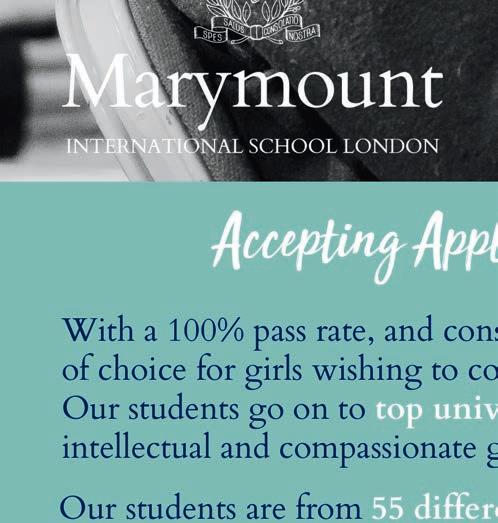
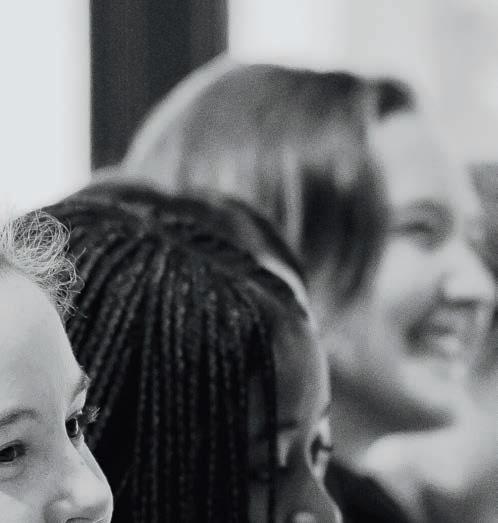

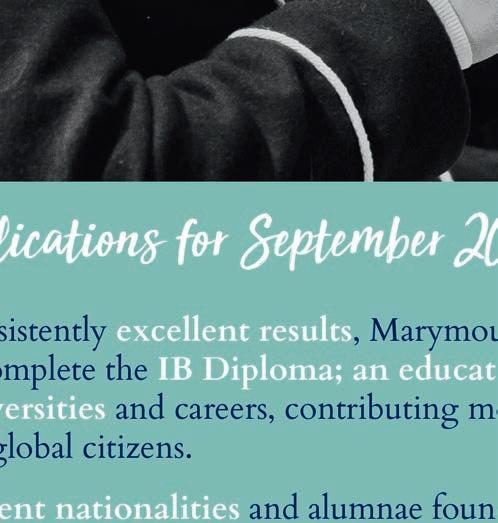




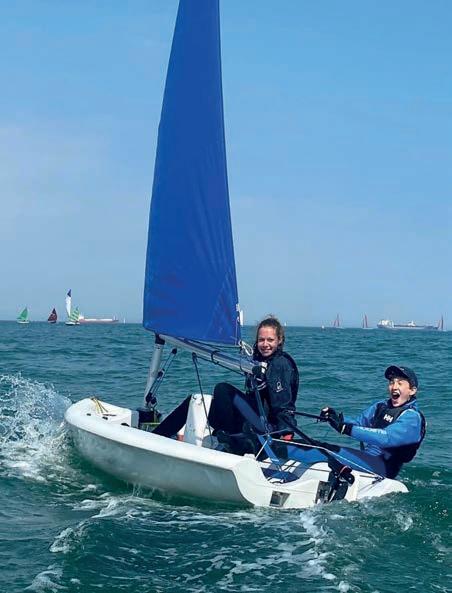



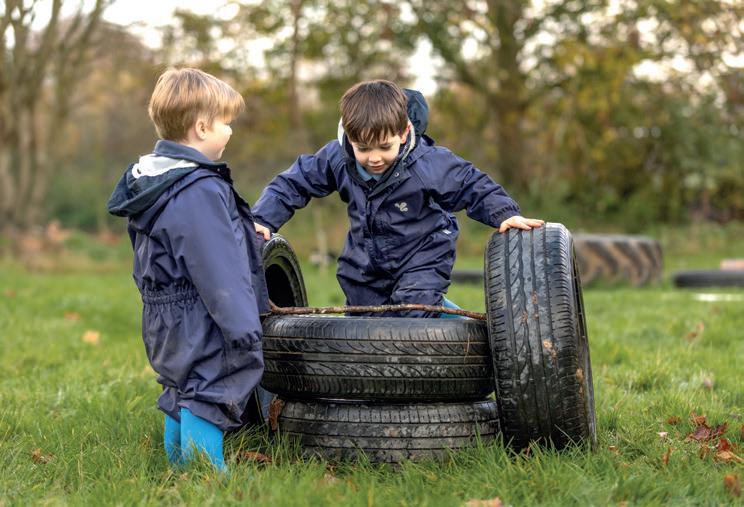


EDITORS
Libby Norman
GROUP
Nicola Owens
GROUP SALES DIRECTOR
Craig Davies
ART DIRECTOR
Pawel Kuba
SENIOR DESIGNERS
Mike Roberts
Suzette Scoble
MIDWEIGHT
Carmen Graham
JUNIOR DESIGNER
Joe Munsey
MARKETING MANAGER
Jessica Shaltout
FINANCE DIRECTOR
Jerrie Koleci
James Fuschillo
PUBLISHING






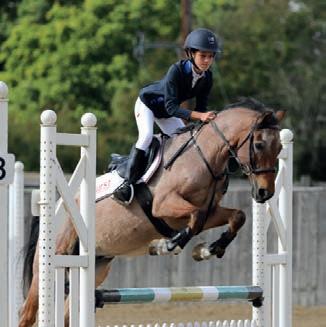

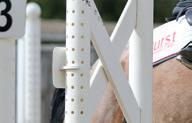





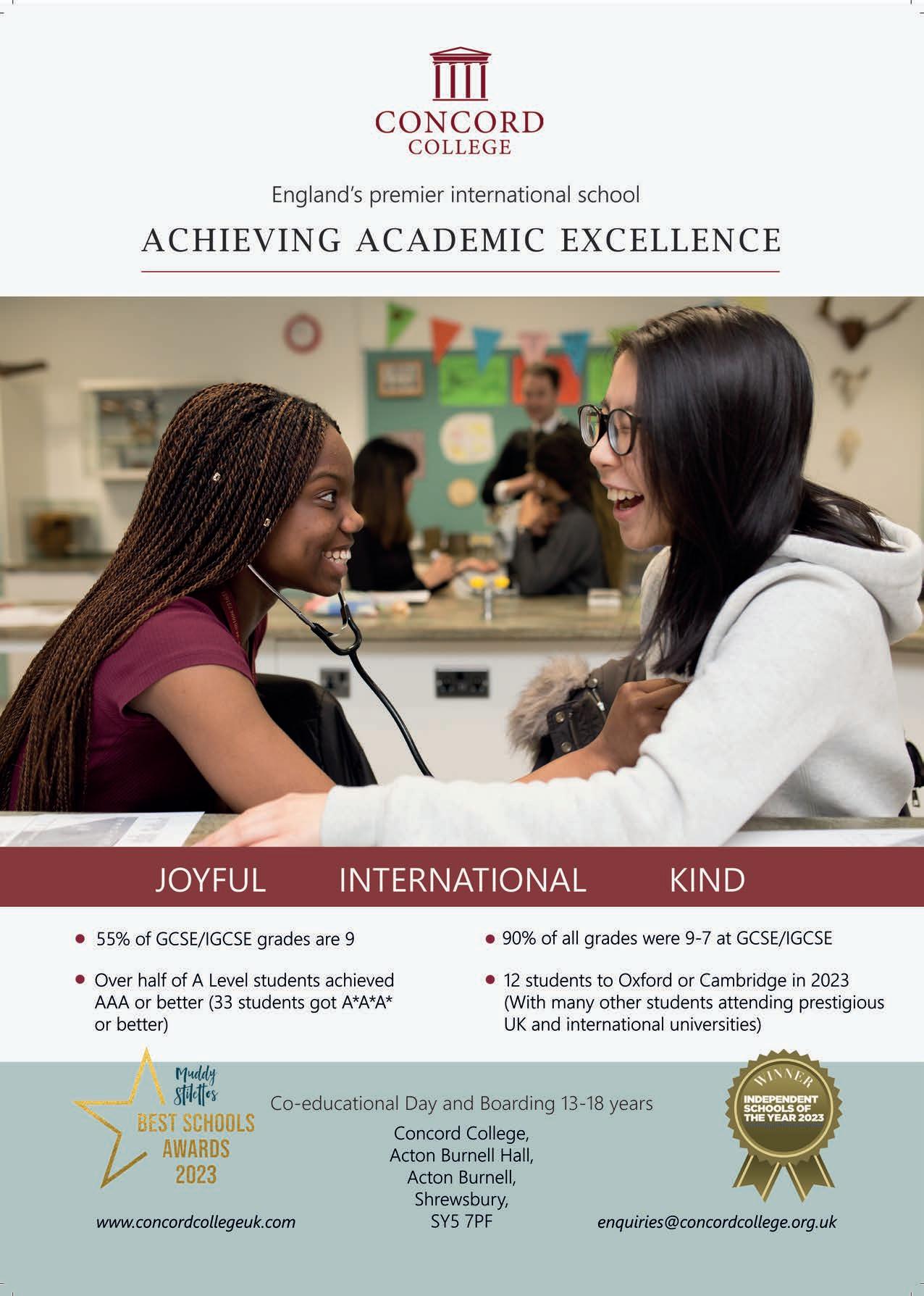
The new year is always, about hope and just a little trepidation. With a proposed redrawing of public exams at 18, it’s hard not to feel sympathy for schools and pupils contemplating yet another potentially seismic shift in education coming down the tracks. But great teachers always rise to the challenges of the times, and always have done so much more than teach to the test.
In Tomorrow’s Skills (page 34), we go back to educational beginnings, looking at the work preps do to develop children’s knowhow – the skills they need to thrive within society, not just education. Meanwhile, in Live Science (page 44), we explore how senior schools take subjects from theoretical to actual. From working out the best flavoured crisps to start a fire out in the wilderness to designing siege weaponry, it’s mind-broadening stu (although let’s hope students never have to use either piece of survival STEM). Of course, while children engage in
“GREAT TEACHERS ALWAYS RISE TO THE CHALLENGES OF THE TIMES, AND DO SO MUCH MORE THAN TEACH TO THE TEST”
Indeed, going above and beyond is a seam running through this issue, with insights from many of our leading independent schools. A strong theme in this issue is the importance of breadth of opportunities. Once pathways are set for university and career, specialism and focus take over. But who knows when young people might continue those earlier interests and passions from school and where they could lead, especially in a future world where multiple careers and ‘side hustles’ are an increasing likelihood?
exciting live challenges, they are also learning useful skills for career success. Future success is what all schools aim to prepare their pupils for, and a British education remains a benchmark for world-class schooling. This magazine hopes to inspire anyone considering a British school for their child.
Libby Norman EDITOR
•









Headmaster, Whitgi School
Chris Ramsey was educated at Brighton College and Corpus Christi, Cambridge and taught at Shrewsbury and Wellington before becoming Deputy Head at Cranleigh. He led King’s College Taunton and, from 2007-17, King’s Chester, before becoming Headmaster of Whitgi . In this issue, he talks about the challenges and benefits of rebuilding group work and face-to-face communication post pandemic.

Headmaster, Aysgarth School
Jonathon Anderson became Headmaster of Aysgarth in North Yorkshire in summer 2023, a move up from Dorset, where he was Head of Clayesmore Prep for the previous three years. A maths teacher and keen sportsman, he talks in this issue about the value of providing the right preparation, support and environment to build life skills and confidence for the onward journey.
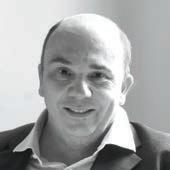
Principal, Concord College
Dr Michael Truss took up the position of Principal of Concord College in September 2021. He studied as a Theobald Scholar in Physics at Balliol College, Oxford, continuing his journey in academia with a PhD in Theoretical Astrophysics at the University of Leicester and a postdoctoral fellowship in Astrophysics at the University of St Andrews. From 2015, he was Deputy Head (Academic) at Barnard Castle School.




























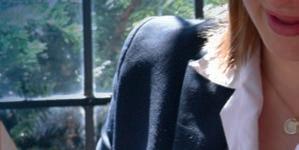

























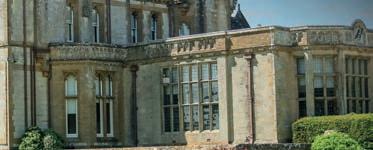












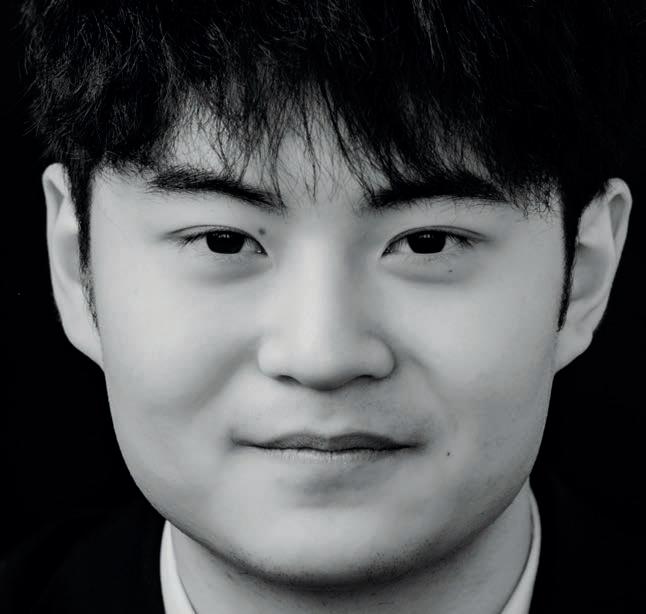

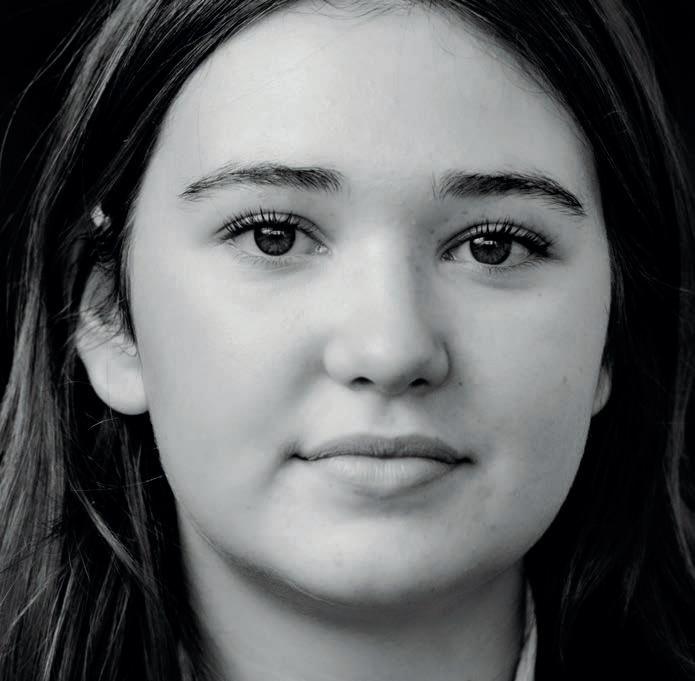
The integration of remote learning and digital advancements marks a new epoch for students, redefining the academic journey.
As we navigate this shift, let us delve into the enriching terrain that lies ahead for students, where the scope of learning extends far beyond the boundaries of traditional classrooms. The adoption of remote learning has provided students in Hong Kong with access to a diverse range of educational resources. Online libraries, interactive

schools abroad o er students a window to the world, allowing them to engage with diverse perspectives and educational approaches without leaving the comfort of their homes.

As Hong Kong’s educational landscape undergoes this transformative journey, we stand on the precipice of a future where the boundaries of learning are boundless. The fusion of remote learning and digital advancements has not only opened doors to a wealth of educational resources but has also fostered a globalised community of learners.
“VIRTUAL CLASSROOMS AND COLLABORATIVE ONLINE PROJECTS SERVE AS CONDUITS FOR CROSS-CULTURAL EXCHANGES”
platforms, and digital databases now serve as invaluable tools, enriching students’ learning experiences and allowing them to explore subjects with unparalleled depth.
Beyond the confines of traditional classrooms, students in Hong Kong are now actively engaged in global collaborations. Virtual classrooms and collaborative online projects serve as conduits for cross-cultural exchanges, fostering connections with peers from di erent corners of the world. This not only broadens their perspectives but also prepares them for an interconnected future.
The digital advancements in education have facilitated overseas learning opportunities for students in Hong Kong. Virtual studyabroad programmes with institutions and
In February, Academic Asia is thrilled to host our yearly Education Expo, o ering a valuable opportunity for school representatives and Hong Kong families to engage with school delegates. This event facilitates in-person interactions, allowing participants to gather information and address any questions directly. Hosting this event in person brings us immense joy, and, once again, it stands as a perennial highlight in Academic Asia’s calendar. We are delighted to host this event in person, and once again, it has always been a highlight in Academic Asia’s calendar.
Battie Fung MANAGING DIRECTOR ACADEMIC ASIA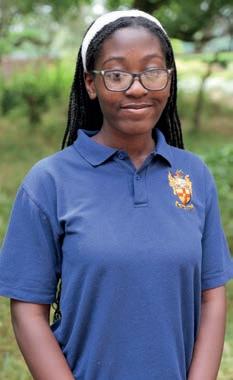
The Leys School Year 10 pupil Tife Y has won The London Institute of Banking & Finance (LIBF) and the Financial Times (FT) Young Financial Journalist competition in the 14-15 category with her article on the theme of the cashless society. Judges commended her piece for its “strong arguments, punchy prose, excellent data and notes”.
“The Leys School pupil Tife has won Young Financial Journalist for her article on the cashless society”






Zaza Veyssiere, star of Hurtwood’s rock extravaganza The Gig of Glory, has just started at the internationally renowned Berklee College of Music. At Hurtwood, Zaza was regularly centre stage, wowing audiences with pop, rock and as the witch in Into the Woods. Berklee College will be back at the Surrey school this term scouting for talent.

Wellington is celebrating a Platinum Artsmark Award from Arts Council England. Director of Arts Simon Williamson says: “We are hugely proud of the Award which acknowledges Wellington’s deep commitment to cultural education and our determination to give every pupil access to the arts, as well as providing support and opportunities for the wider community”.

Felsted School alumnus Max Malins made his Rugby World Cup debut in England’s clash with Chile as part of the starting XV, and in a match that earned England a 71-0 victory. Pictured while playing rugby for the school, he is one of eight former pupils – boys and girls – currently playing professional rugby.
King’s Ely A-level student Sayuri Okunushi, 18, has achieved the Associate of Trinity College London (ATCL) Diploma in piano – equivalent in standard to the fi rst-year recital of an undergraduate degree. She joined the school’s International Year 11 programme in 2021 and also attends the Royal College of Music Junior Department.
“Art is about changing what we see in our everyday lives and representing it in such a way that it gives us hope”
KEHINDE WILEY

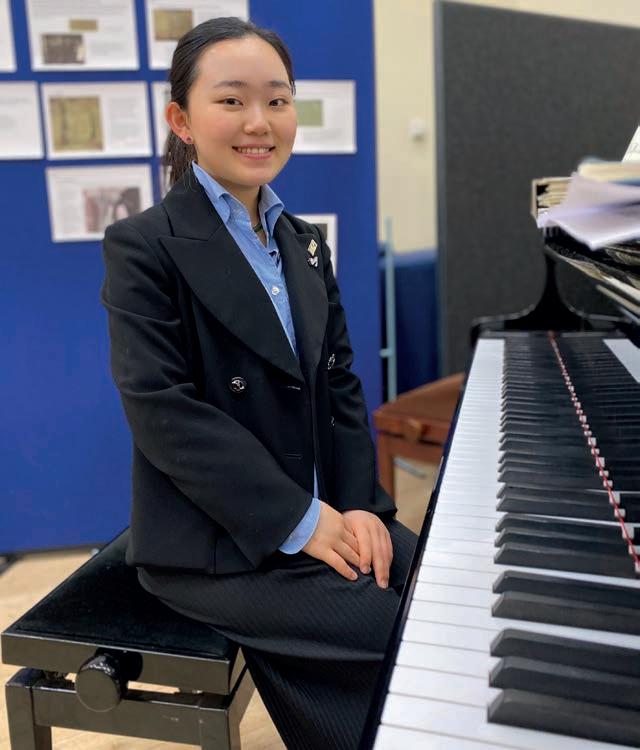
Rugby School has appointed Nihal Kumar, 17, as student Poet Laureate, editing its annual creative writing anthology Rabbit Hole Additionally, Anthony Anaxagorou (winner of this year’s Royal Society of Literature Ondaatje prize) is the school’s third Poet in Residence and will host poetry readings and workshops for school and wider school community.


Alexandra Haydon becomes Head of Francis Holland School, Sloane Square from January, succeeding Lucy Elphinstone. Currently Deputy Head, Academic at Millfi eld, she was Senior Teacher at St Mary’s Calne prior to that. She won the i25 award for innovation and infl uence in the independent sector in 2019.


Tonbridge School’s Giving Day raised over £500,000. People from across the school community worked together to increase Foundation Award recipients to at least 100 by 2028, when Tonbridge celebrates its 475th anniversary. On the day, 700 children from 14 local schools took part in fun activities at the school.
















The Kingsley School in Royal Leamington Spa will start becoming a fully co-educational setting from September 2025, initially admitting boys into Years 7 and 12. The day through school, which celebrates its 140th anniversary next year, is part of the Warwick Schools Foundation and is led by James Mercer-Kelly.

Oliver Knight will become Head of Pangbourne College from September 2024, succeeding Thomas Garnier. It will be his fourth headship – he is current Principal of Ark Acton Academy. He is also an author on education, sits on the board of a multi-academy trust and is an independent school governor.



“If there aren’t roles you want to play, then you’ve kind of got to create them”

“WE MUST NURTURE CREATIVE SCIENTISTS IN AN ENVIRONMENT THAT ENCOURAGES INTERACTIONS AND COLLABORATIONS ACROSS DIFFERENT FIELDS”
AHMED ZEWAIL


Geography pupils at Malvern College won a prize in the My Environment My Future competition for their proposal to transform a derelict shop into a community bar and hub. Max and Seb Wilson, Ethan Chan, and Henry Needham impressed judges with plans for an outdoor performance space, kitchen garden and sophisticated waste management approaches.
Stephen Perse Foundation
Year 10 student Ruben tied in fi rst place at the U16 British National Chess Championships. Ruben, who fi rst competed in the nationals in 2018, played over fi ve days and seven rounds for the win. He says: “It feels great to achieve fi rst place, something that I have been working towards for the last six years”.
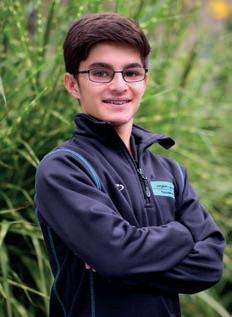
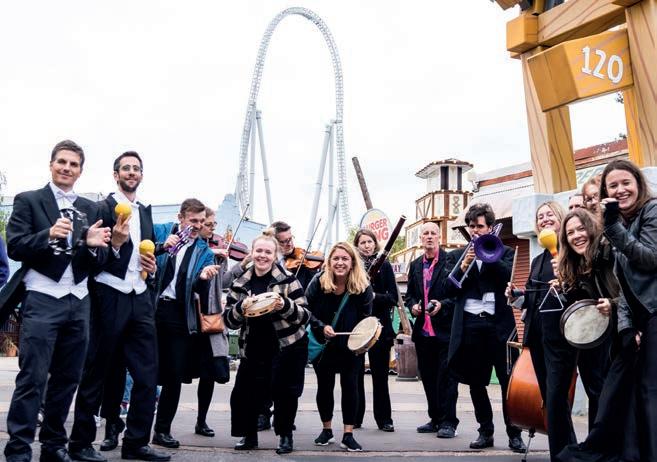






Frensham Heights has introduced Arts Awards for artists, dancers, musicians and performers joining the Sixth Form. The Arts Awards will prepare students for the industry in their artistic discipline while supporting them academically. Arts Awards are open to all day and boarding students studying one or more Performing or Creative Arts subject.

Andy Watts joins Reed’s School as Director of Sport – the first external appointment to this role in a number of years. Having led sport at both Kingston Grammar and Magdalen College School, he brings a wealth of leadership experience to the extensive sports programme.
Annabel Rolls has become the new Head of Year 3 at Cumnor House Sussex. Previously with Wetherby Pre-Prep in London, and with some 17 years’ teaching experience, she joins the day and flexible boarding school to guide and support young learners as they move into their prep years.
The Royal Philarmonic Orchestra and ACS International Schools have signed a partnership. Students across its schools – Cobham, Egham, Hillingdon and ACS in Doha – will have the opportunity to participate in virtual and inperson performances, lectures and workshops hosted by the RPO’s musicians and artists. This will become part of the group’s planned Arts Pathway.

Dr Graham Mallard is now Taunton School Deputy Head Academic. He was previously Assistant Head at Cli on College. He has written six books, his most recent covering behavioural science in teaching and learning. He succeeds Damian Henderson, now Principal at King William’s College, Castletown.







“ WE LIVE IN A SOCIETY EXQUISITELY DEPENDENT ON SCIENCE AND TECHNOLOGY, IN WHICH HARDLY ANYONE KNOWS ANYTHING ABOUT SCIENCE AND TECHNOLOGY”
CARL SAGAN









Warwick Schools Foundation is continuing its range of musical partnerships a er a busy year. The Foundation’s new Executive Music Lead Stuart Thompson, who joined the Foundation recently from Leicestershire, is working to develop the musical community and enhance music opportunities in the town and local area still further.
MusicShare marks its 20th birthday by staging Britten’s Noye’s Fludde in Lichfield Cathedral on 10th-11th November. This involves 200 children from local schools, plus Lichfield Cathedral School musicians, singers and teachers.
MusicShare is an Arts Councilfunded partnership between the school and cathedral. It has worked with over 25,000 school children over two decades.

Stamford Schools Principal Will Phelan, Head Vicky Buckman and Chair of Governors Tom Cartledge celebrated the new school year as Stamford Schools officially opened its doors. This merger between Stamford High and Stamford School means from September 2024 the school will be co-ed across every year group.

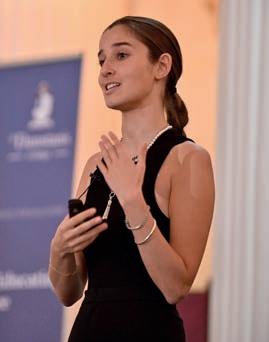
St Dunstan’s College hosted a conference in June on children’s exposure to porn, bringing together delegates from 100 state and independent schools. Head Nick Hewlett was joined by international speakers, including Nicole Daley and Jess Alder, creators of the Truth about Pornography Curriculum, and founder of Teach Us Consent Chanel Contos (pictured).
Cobham Hall has announced a new music partnership with Steinway & Sons. Cobham’s stunning 17th century ‘Gilt Hall’ music room will soon be home to a Model B Grand, giving its music scholars the chance to play Steinway’s ‘perfect piano’ and participate in masterclasses with its extraordinary artists.

Martin Speight joins Repton next January as Technical Director of Cricket. A talented wicketkeeperbatsman, and formerly with Sussex and Durham, he was the recipient of the Walter Lawrence Trophy for the fastest First-Class century, although he is most remembered for his performance in the 1993 NatWest final.
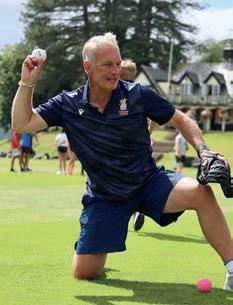
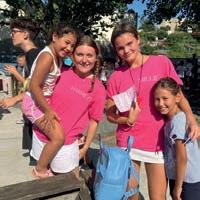
A team of 23 Dauntsey’s pupils and staff headed to Romania over the summer to work with Nightingales Children’s Project. The school has a longstanding relationship with the project and received huge practical support from the local community. Those on the ground quickly put donated supplies to work, running a six-day activity programme for local children.
“Dauntsey’s has a longstanding relationship with Nightingales in Romania”















SOMETHING THEY SAID
“ALL SPEECH, WRITTEN OR SPOKEN, IS A DEAD LANGUAGE, UNTIL IT FINDS A WILLING AND PREPARED HEARER”
ROBERT LOUIS STEVENSON
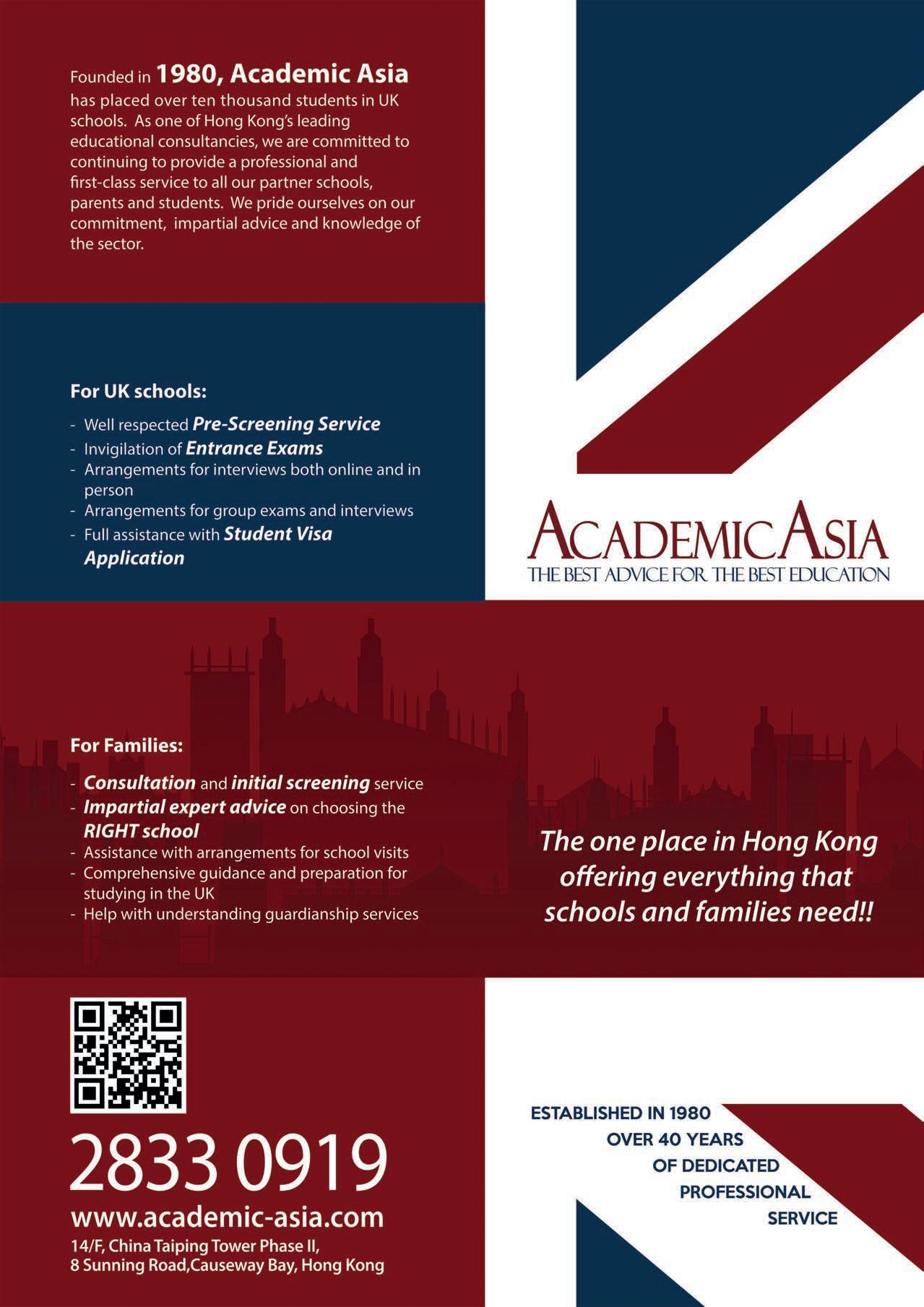

See page 22

“THE REAL WORLD DEMANDS NOT ONLY COGNITIVE ABILITIES, BUT ALSO EMOTIONAL INTELLIGENCE AND ADAPTABILITY”

More than ever, there is now a realisation that success in life requires a diverse set of skills.
Dauntsey’s School equips pupils with more than just academic success
The final two weeks of August have long been known as a time of angst for many pupils in the UK as they await their GCSE and A Level results, grades which traditionally would determine what their future may hold. Whilst academic achievements remain undeniably crucial, leaving school with more than just good grades is increasingly recognised as essential for preparing pupils for the challenges of the modern world.
More than ever, there is now a realisation that success in life requires a diverse set of skills, beyond what is assessed in exams. The real world demands not only cognitive abilities, but also practical skills, emotional intelligence and adaptability. By engaging pupils in a variety of activities beyond the academic curriculum, pupils are able to develop a more comprehensive
skill set that will prepare them for the multifaceted nature of life.
The idea of going beyond the academic curriculum is not a new concept for most schools, with many o ering extensive club and activities programmes to all pupils. Schools recognise that these extracurricular activities provide a platform for personal growth and development, perseverance and determination, and leadership and initiative.
The benefits of a holistic and integrated co-curricular programme are central to a Dauntsey’s education. Ten years ago, the school appointed a Head of Adventure Education; their task was to bring together existing adventure programmes while also continuing to evolve and develop the o ering, ensuring all pupils would benefit from the consequences of an adventurous education. These programmes are not optional: all pupils participate, and all will benefit, albeit it in very di erent ways.
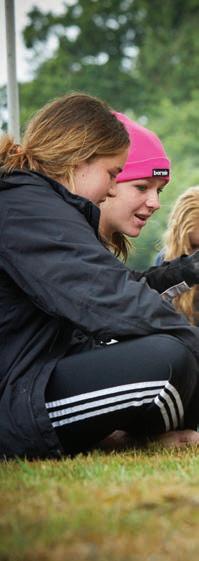

“We strive to instil a strong spirit of adventure in all of our pupils, believing that doing so will serve them as well outside of the classroom as it will inside. Our programmes are developed to ensure that we bring the best out of all pupils, helping them to push themselves outside of their comfort zones and achieve what they never thought they could,” says Sam Moore, Head of Adventure Education.
In 2021, the Dauntsey’s Moonrakers Programme celebrated its 50th anniversary. This programme is a dedicated adventure programme for all Third Form (Year 9) pupils. Every Friday afternoon, pupils take part in a variety of activities, including kayaking,
outdoor cooking, archery, climbing and more – all focused on encouraging pupils to develop valuable life skills such as co-operation, communication and leadership.
The timing of the Moonrakers Programme is not a coincidence.
Third Form is a time of change for many: Dauntsey’s traditionally welcomes approximately 40 new pupils at this point, academic work steps up a gear as pupils near their GCSEs and Form groups change, and as top of the Lower School, there is an expectation that the pupils act as role models to the younger years and start to take on positions of responsibility within their Houses. The
Moonraker Programme considers these factors and provides all pupils, new and old, with common ground to come together as a team and develop new skills.
As pupils progress through the school, there remain plenty of opportunities to develop new skills and take on new challenges, such as on Jolie Brise, the school’s very own Tall Ship, on which all pupils will spend at least 24 hours before deciding whether sailing is something they wish to continue with, or volunteering some of their time at a local primary school.
Aside from the Adventure Programmes, Dauntsey’s o ers over 80 di erent clubs and activities to
“EVERY FRIDAY AFTERNOON, PUPILS TAKE PART IN A VARIETY OF ACTIVITIES, INCLUDING KAYAKING, OUTDOOR COOKING, ARCHERY, CLIMBING AND MORE”
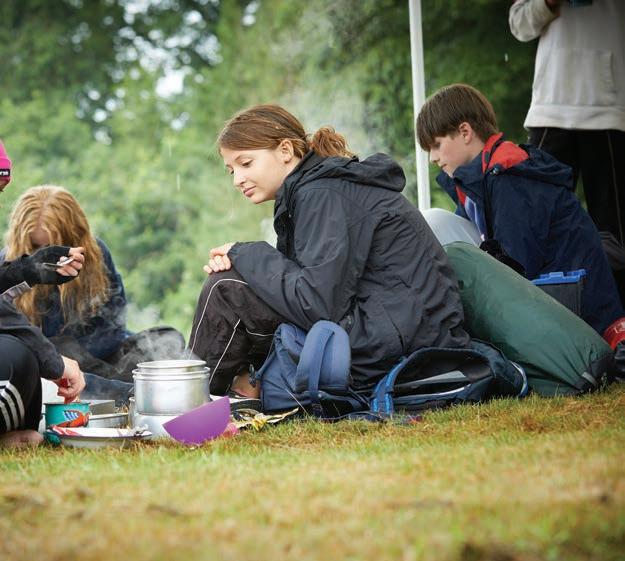
pupils on a weekly basis. All of the clubs are run by enthusiastic members of sta , with many of the clubs having been started at the direct request of pupils. The school day is structured to allow for two long breaks each day; this allows plenty of time for co-curricular interests, and ensures that all pupils – day or boarding – are able to participate. Activities range from Mahjong and Drama Tech to Rock Society and Bee Keeping.
Beyond nurturing a ‘can-do’ attitude and developing mental and physical resilience, these adventure programmes and co-curricular activities ensure that pupils leave school with more than just their academic achievements. They create well-rounded individuals, with varying interests and a zest for life. At Dauntsey’s, the ultimate priority is the happiness and fulfilment of everyone in the community. They aim for pupils to do better than they would anywhere else and to be a school where everyone can be themselves, where friendship and kindness really
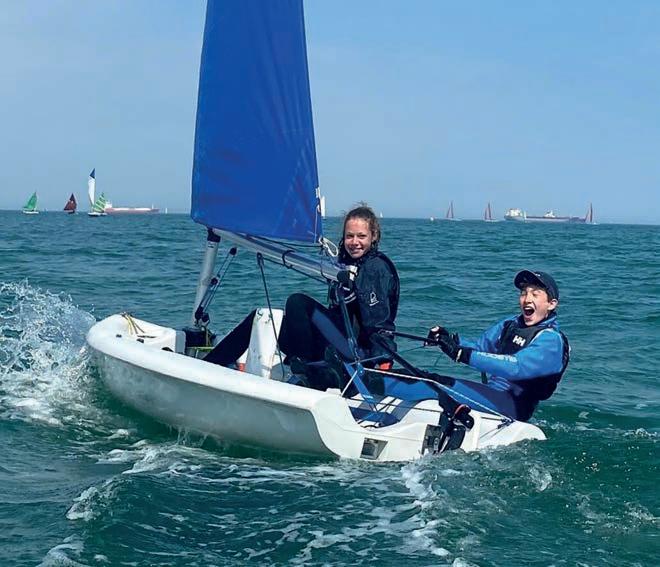
matter and where pupils make the most of their talents and abilities.
We live in a fast-changing world and school must equip young adults with the resilience, intellectual curiosity and flexible thinking needed to thrive in life beyond the school gates, in the widest range of career paths.
Dauntsey’s o er first-class, tailored university and careers advice in order to find the best future path for each individual. Whether applying for university or for a first job, it is these added extras that add depth and character to the candidates profile, and with an increasing number of high achieving pupils, vying for limited spots at top-tier universities (in 2023 there were over 750,000 applications for full-time undergraduate places through UCAS), applicants need to stand out more than ever.

FOUNDED: 1542
HEAD: Mark Lascelles
GENDER: co-educational
NUMBER OF PUPILS: 860
DAY OR BOARDING:
Day and boarding
AGES: 11-18
POINTS OF ENTRY: 11+, 13+, 16+ and occasional in year entry (subject to availability)
ADMISSIONS:
admissions@dauntseys.org
Those whose first language is not English and/or who live overseas take our entrance examinations either at their agent’s offices, their own school, or at British Council offices. Interviews are by arrangement, either in person during a visit following entrance exams, or via Microso Teams.
RELIGIOUS AFFILIATION : Christian foundations, and welcoming all faiths
FEES:
£22,800-£43,590 per year, depending on age group and boarding option
ADDRESS:
West Lavington, Devizes, Wiltshire, SN10 4HE; 01380 814500 dauntseys.org
Transformative is a word frequently used to describe the benefit of a bursary, and it is undoubtedly true that in a world where opportunity can hinge on access to quality education, the provision of a full award, including a wider package of support, to attend an independent school can be a life-changing gift. Of 220 means-tested awards held by pupils at Dulwich College (valued at £4.4m), 129 are for full fees.
The impact of financial assistance is felt far beyond individual lives. It is often why schools’ bursary funds are supported so enthusiastically by parents and former pupils. They recognise the benefits social diversity in the pupil body brings for the wider community.
A diverse community enriches the educational experience for everyone and fosters empathy, and adaptability. It brings together individuals with di erent backgrounds and life experiences, preparing them to flourish in a global community. A bursary award can instil a sense of pride and accomplishment that radiates from the scholar to all those who have supported this journey. Parents witness their child’s burgeoning confidence, and the extended family unit can become a dynamic hub of support. We have full fee-paying pupils at the College whose father or grandfather attended the school because of a bursary award.
Independent schools can become catalysts for unlocking and nurturing untapped potential for the benefit of others. As Dulwich alumnus CJ Obi, UCL graduate and founder of Urbanist Platform, puts it: “There is a direct, tangible impact that receiving financial support in
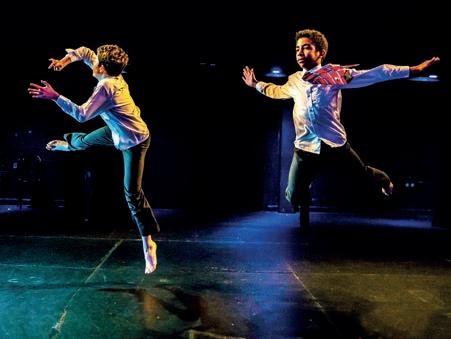

“We have full feepaying pupils at the College whose father or grandfather attended the school because of a bursary award”
the form of a bursary has had on me. It’s there in all my work as I help to shape places, towns and cities, and inspire people today”.
Pupils who benefit from bursaries very often develop a deep appreciation for the power of education. They go on to become advocates for equal access to quality learning, using their experiences to champion educational opportunities for others.
Demonstrating a commitment to accessibility and inclusivity through means-tested bursaries and making a genuine contribution to positive social change can help dispel the notion of exclusivity and elitism that can surround independent schools. Many
parents at Dulwich are drawn to the school because of our social mission.
Pupils and their families who benefit from bursaries often commit to a lifetime of philanthropy and giving back to society. Many donors to our Bursary Appeal Fund are alumni who themselves benefited from financial assistance, also existing bursary holding families. They speak passionately about their time at the school and what they themselves contributed.
A school’s bursary provision lies at the heart of fostering inclusivity, social mobility, and a deep sense of community, creating an environment where every pupil can thrive and contribute their unique gifts. For many parents, this ethos is one important part of how they select a school for their child.

Deputy Master External Dulwich College
RATED ‘EXCELLENT’ - ISI INSPECTION REPORT (OCTOBER 2022)

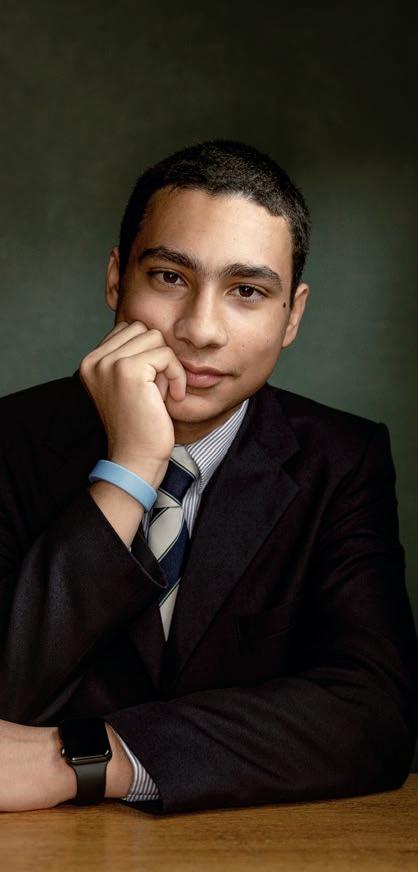

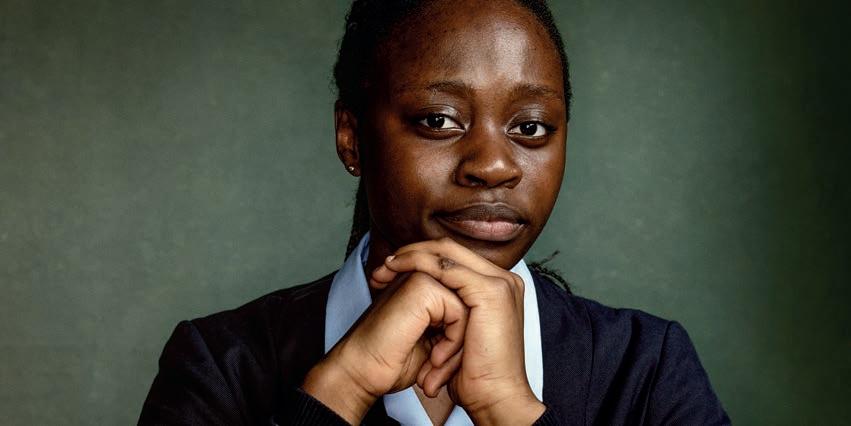
VIEW OUR VIRTUAL TOUR ONLINE






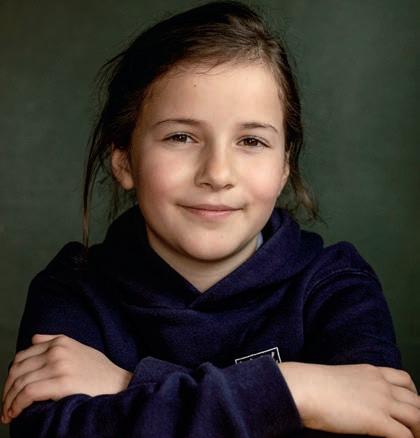

With our ambitious learning culture, a focus on every individual and a breadth and blend of opportunities, we help every child to discover and develop their talents to create their own life-story.
Our size, structure and ethos mean that our entire focus is on understanding, guiding and inspiring each child individually – so they can find their own voice, their confidence, self-belief and aspiration, discover their own talents, challenge themselves to achieve more than they thought possible and reach their full potential.
There is no typical Framlinghamian, no singular path that we take: we are academics, actors, musicians, expeditioners, sports people, innovators, scientists, ruminators, decision makers, story tellers, teammates, artists, fun lovers, nurturers and thought provokers.
Often we are many things within one. But, we are all individual with our own story.
To arrange a discussion with our Admissions team,
call 01728 723789 , email admissions@framlinghamcollege.co.uk
or visit framlinghamcollege.co.uk
A major long-term study will provide important data on both UK education and growing up during and after the pandemic
We are surrounded by ‘pop’ surveys –headline-grabbing findings that make lively news but often don’t give us much in the way of reliable information. G ood then to have a major longitudinal study into education, beginning this year and designed to provide a solid base of evidence about what it’s like to grow up in the here and now
‘Five to Twelve’ is being undertaken by the National Centre for Social Research and has been commissioned and funded by the Department for Education (DfE). There will also be collaboration with the National Children’s Bureau and National Foundation for Educational Research. The study of primary and early secondary education runs over a five-year period. Importantly, data from the longitudinal study will be gathered from independent schools as well as the state sector.
Longitudinal studies are, of course, a very di erent beast from their snapshot cousins as Jules Allen, Senior Researcher on ‘Five to Twelve’, explains. “The main benefit of a longitudinal study as opposed to a single wave (which we call a cross-sectional study)
is that, because we collect data at repeated intervals over time, researchers who use the dataset can identify developments and changes in the population that we’re studying,” she says. “You can look at causation rather than just correlation.”
Longitudinal studies require careful design. “We definitely do not start these studies with what we want to say, we start with what we want to find,” says Jules Allen. What is under the spotlight here is understanding more about education outcomes and inequalities – why some children do better than others and the multiple factors shaping these outcomes.
“Importantly, the longitudinal study will span not just the state sector, but independent schools”
The groundwork for ‘Five to Twelve’ began in summer 2022 and a ‘dress rehearsal’ took place in spring 2023. While many longitudinal studies begin by randomly sampling postcode files, the target here is specific – children in schools – so both studies began with the DfE central database of all children in school. That database was then used to randomly select children via their schools. As study parameters include insights into the independent sector (where there’s no such central database), the research team asked independent schools to opt in. From there, they were able to gather a random sample of pupils for the study.
For ‘Five to Twelve’ participating children have annual cognitive exercises until Year 6, when they respond to questions. For their parents, there’s a mix of face-to-face and online or phone surveys annually. Teachers are asked for input too, with an additional element where headteachers respond to describe school ethos, culture, and so on.
This body of evidence gathered over time requires buy-in and commitment from all those involved. Jules Allen says they are delighted so many have responded so positively. “People are quite enthusiastic. In
ABOVE ‘Five to Twelve’ monitors progress and areas such as wellbeing

particular, we’ve found that children really enjoy the cognitive exercises. And teachers too – despite how busy they are – we have found that they respond to the survey.”
We should be grateful to these thousands of participants for their time because their input will provide a seam of really useful data in the public domain. It might be used to draw comparison with earlier or later surveys to see di erences
over time, or to gain closer insights into di erent educational experiences – and educational inequalities. It will also give us insights into areas such as wellbeing.
Then there is the impact of Covid – never far from the surface in any current debate. “All of the children who will participate will have lived through Covid,” says Jules Allen. “Although we can’t compare Covid with past studies,
we can look at outcomes and di erences.”
In a world of ‘pop’ surveys, such carefully gathered study results will surely be worth the time and e ort involved. In a little over five years’ time, findings will shine a light on the longer-term impact of pandemic restrictions on our children. This will inform future thinking on how to manage both ingrained inequality and events that impact young people’s access to school.
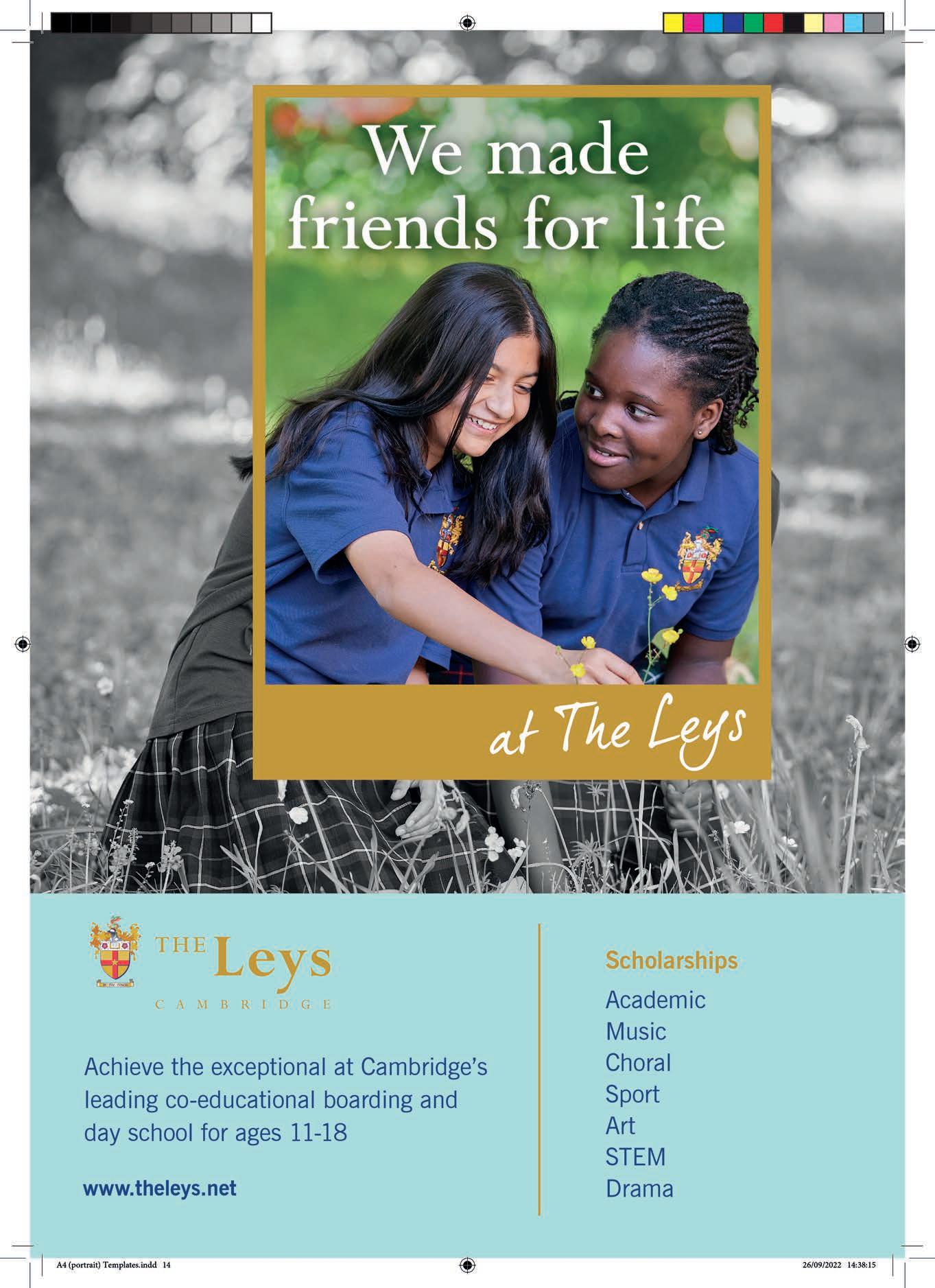
Dyscalculia, like dyslexia, is in the family of specific learning di culties (SpLDs) but is a term that is much more recent than its literacy counterpart. As such, it has much less research, advice and resources associated with it.Dyscalculia can present itself very di erently and there is no ‘one size fits all’ approach to supporting students. It takes careful assessment and may require attempting a variety of di erent strategies to find out the right approach to support each individual.
For someone with dyscalculia, maths is a very abstract concept. To overcome this, students can use objects to create mathematical calculations. The physical nature of moving objects supports them in understanding if a number is growing, shrinking, being shared, and so on.
At Abingdon House, we use this method to start new concepts and create a depth of understanding, even up to GCSE-level. Once using manipulatives has been mastered, we introduce concepts that can be drawn on paper but still without using abstract numbers. Here, students may draw pictures, lines or
“Being positive about numbers and maths can go a long way to supporting dyscalculic children and children with maths anxiety”
dots and will count them in order to know the value of the number being represented.
Finally, we implement the use of abstract numbers. Someone with dyscalculia will often use pictorial alongside number sums for a significant period of time. They may even continue to use the pictorial method permanently if that is

what supports their understanding.
Students with dyscalculia often have di culty in remembering number facts, such as number bonds, times tables or the order of numbers. These are all important parts of maths and should be explicitly taught. However, they may become unhelpful barriers when learning new concepts due to the additional working memory load required. Here, the use of visual multiplication grids, number bonds or number lines can reduce the stress of trying to remember taught facts.
Dyscalculia can often lead to maths anxiety.
Of course, anxiety is not limited to children with dyscalculia, but there is a significant co-occurrence which can be reduced by individualising lessons to focus on areas of strength –even literacy focused areas
such as vocabulary learning. For students who have a strength within literacy this may be an area where they find success and, as such, build their confidence.
Being positive about numbers and maths can go a long way to supporting dyscalculic children and children with maths anxiety. Maths is a subject di erent from all others in that it has become socially accepted that people are ‘bad at maths’. Indeed, it is commonplace to hear people say they hated maths at school.

While this might be true, as adults we all have a responsibility not to share our own anxiety or negative feelings. Children pick up on these things remarkably quickly and such concepts then become normalised. We must give all children the best chance to succeed – and this starts with a maths-positive approach.

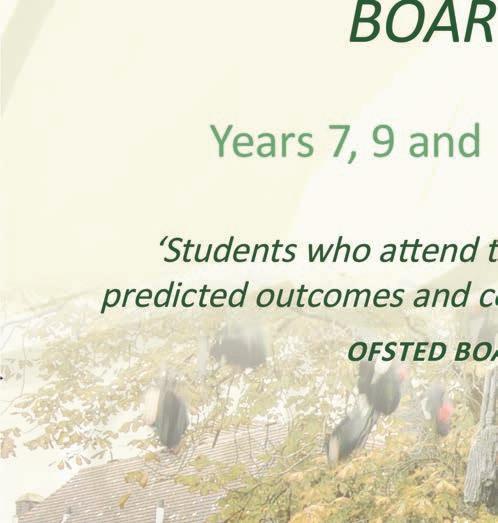

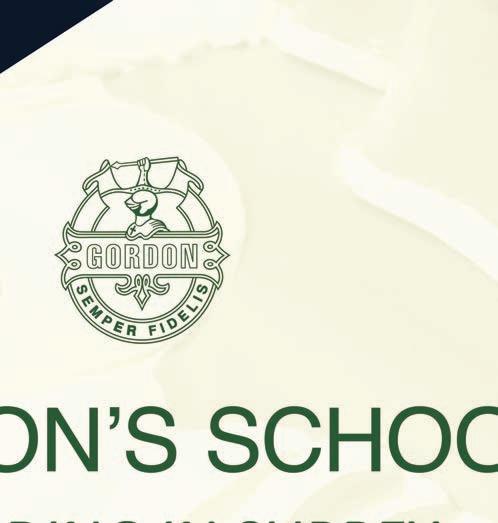
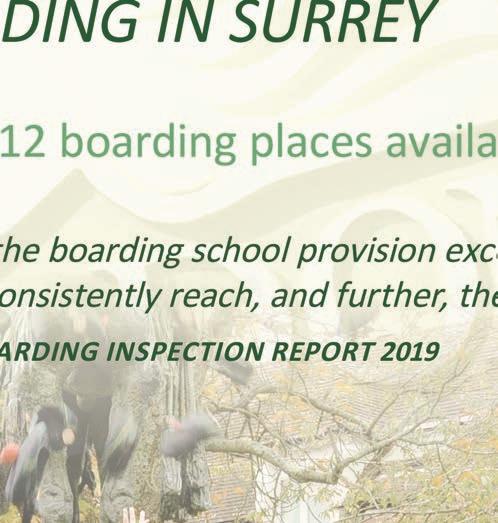
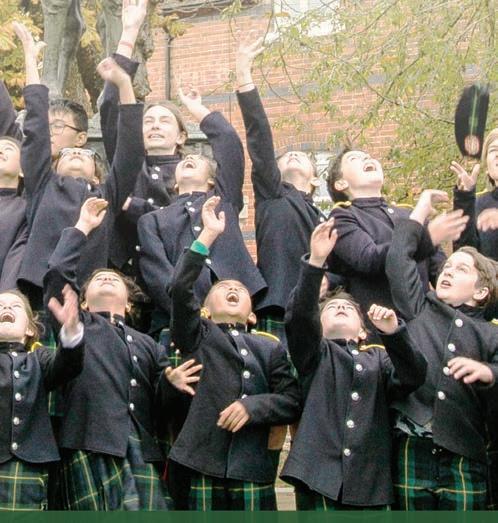



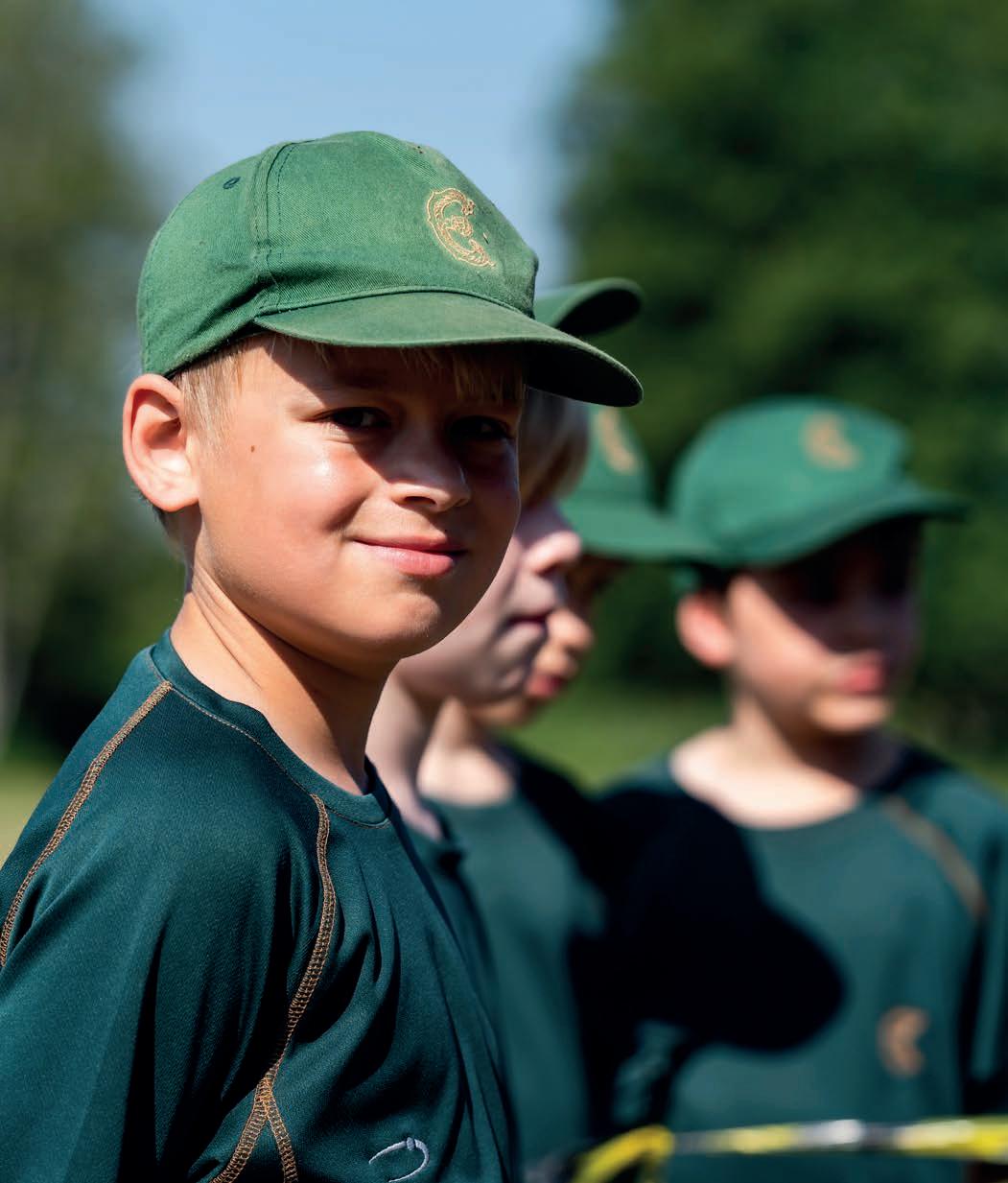
Pupils from Embley School Page 36

Teaching skills for life is an essential element of the prep years, helping to develop confidence, knowhow and responsibility. We speak to schools building empowered and engaged young citizens from the earliest years
At JAGS in Dulwich, pupils get an early start in developing skills for navigating modern life. “We are committed to creating a holistic education which ensures our pupils thrive in every situation,” says Kerri-Anne Bannon, Deputy Head, Pastoral at JAGS Junior School. “In tandem with our Maths curriculum, a carefully curated PSHCE curriculum has been developed which includes a dedicated unit on the world of money and work.”
This element expands as pupils progress through the school, incorporating understanding job opportunities, financial influences and balancing needs and wants. “On top of this, guest speakers from the financial sector provide firsthand insight into investment and savings,” says Kerri-Anne Bannon. The thinking here is clear – promoting healthy discussions about money from a young age.
There is focus, too, on developing pupils’ social skills. “We are currently working towards UNICEF’s Rights Respecting Schools Award, with the aim of achieving Silver accreditation by July 2024.” This year,

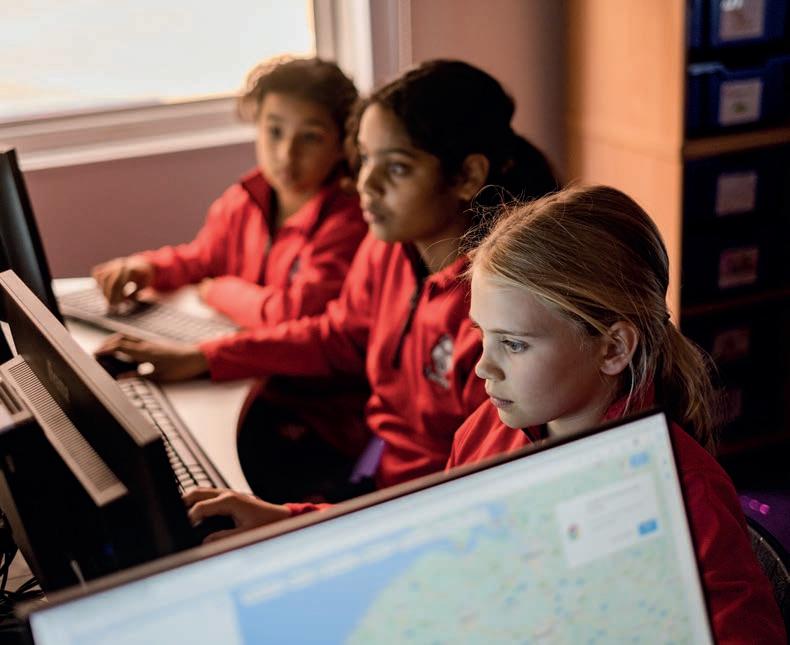
“At JAGS Junior School, guest speakers from the financial sector provide firsthand insight into investment and savings”
the school also unveiled its ‘Bee Brilliant!’ Junior School values. “They crystallise all the attributes we hope to see in our pupils, as they are inspired to be Kind, Brave, Respectful, Resilient, Inclusive and Authentic.” Pupil Voice plays a pivotal role in co-curricular activities to ensure what’s on o er taps into children’s interests. “Following feedback, we introduced skateboarding, fencing and bouldering clubs last year.”
Communication is critical and Kerri-Anne Bannon says there are lots of practical routes to building skills. For instance, JAGS Junior School has close links to local care homes and this o ers the opportunity for pupils to exchange letters with residents. “Children recognise how the form of such letters di ers from those, for example, to our local MP when they are lobbying over an issue close to their hearts.” They are also taught about getting the tone right with other communications –especially emails – within computing lessons.
JAGS is introducing 1:1 digital devices for all pupils in Years 3 to 6, so digital safety (and savvy) is critical. “As well as engaging with Childnet and celebrating Safer Internet Day, we explicitly teach children the tools to stay safe online as part of our day-to-day
classroom practice.” Thinking critically is specifically addressed. For example, pupils are taught the di erence between online and real-world friendships, as well as how to get help if they ever feel in danger. Pupil teaching is supported by JAGS Parent Talks – ensuring everyone is on the same page when it comes to appropriate use of digital devices. Children are also taught about selfregulation and when to switch o devices.
Knowledge and skills for life are enabled in many other ways. Pupils participate in the Junior Duke Award, which has a focus on practical life skills and independence. There’s a mentorship scheme to help the older pupils at JAGS Junior – pairing Year 6 pupils with Year 12 students in JAGS Senior. This is mutually beneficial, developing leadership skills for older students and helping mentees benefit from interactions with positive role models. JAGS Junior pupils are also taught about the value of contributing to both local and global community. For instance, they write Christmas cards to residents of nearby care homes, support drives for the local food bank and fundraise for charities such as the Red Cross in response to real-world global situations.
At The Kingsley School in Royal Leamington Spa, a fresh initiative has just been unveiled to prepare pupils for the world to come.
“We have rolled out our new 4D Curriculum in the Prep School this year, following an extensive audit, research and design process,” says Head of Prep Jennie Phillips. “The curriculum is designed to prepare pupils for future success and is built around key skills that will not only stand them in good stead during their school years but are also highly valued by employers.”
The new curriculum embraces a wide range of social and environmental themes. Pupils work on challenges and projects set in real-world scenarios, encouraging them to make links between subjects and themes while building an understanding of their place in our fast-changing world.
The Kingsley School recently established a partnership with 8billionideas. Its award-winning team deliver workshops and challenge packages designed to build entrepreneurship, digital fluency and collaboration. “The result is a school environment where pupils understand that taking risks and making mistakes is a crucial part of the learning process,” says Jennie Phillips. She adds that this approach is also important in teaching them to value the ideas and opinions of others – and to celebrate their own and others’ success. “Pupils perform extremely well academically against national benchmarks, but gains in confidence, independence and resilience are equally highly valued.”
Enrichment is another key way in which the school helps children grow and learn to make choices. With activities as diverse as first aid, horse riding, yoga, debating and STEAM Challenge, there’s something to appeal to everyone. Co-curricular activities also build strengths and confidence, and with plenty of opportunities for participation in music and sport. Musicians at The Kingsley School have multiple ways to perform, in string ensembles, orchestra and choirs, while gifted players have the opportunity to play alongside counterparts within
ABOVE & BELOW
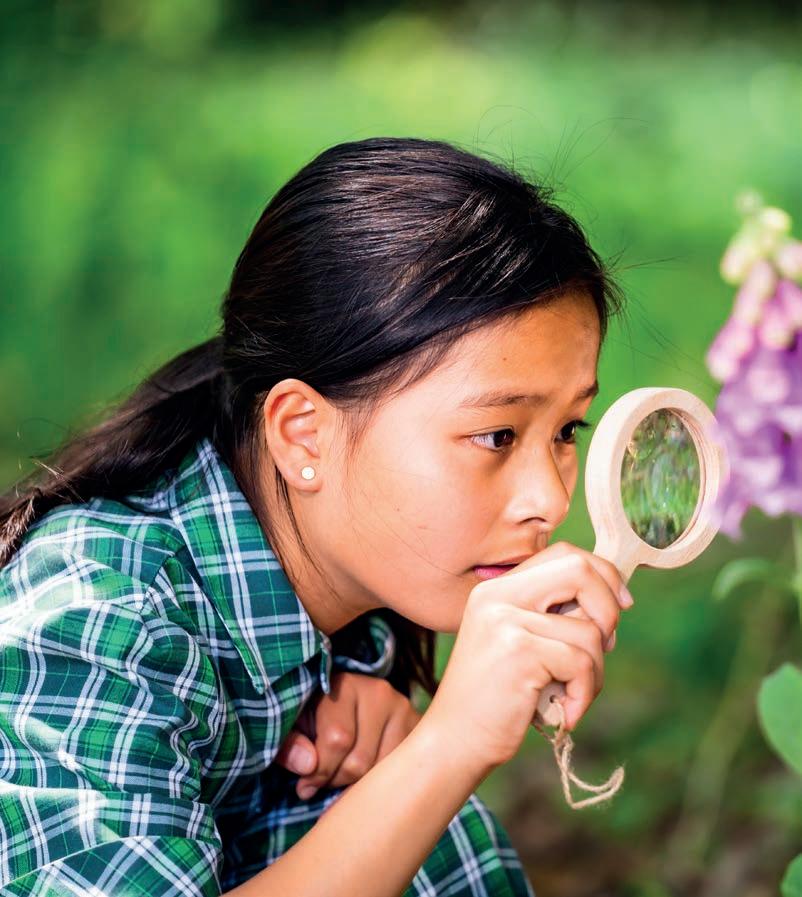
Warwick Schools Foundation Orchestra. Sports teams are also a big opportunity to shine, with the school participating across many disciplines. “Children are encouraged to experiment with a wide variety of disciplines, which has led to success in tennis, skiing, martial arts, gymnastics, cricket and rugby,” says Jennie Phillips. “We also have a long and successful history in equestrian events, with pupils as young as eight competing at senior level.”
With development and expansion of Foundation sporting facilities, there is the opportunity to increase the school’s o ering, and develop further sports that are seeing a surge in popularity for both boys and girls, including cricket and golf. “Both at Kingsley Prep, and throughout the wider Foundation, there is an understanding that the pupil experience is top of the agenda in order to provide the best preparation for future success. There must be a commitment to innovation and the flexibility to provide the best outcome for each individual pupil,” adds Jennie Phillips.
“Pupils at Kingsley understand that taking risks and making mistakes is a crucial part of the learning process”
At Embley School in Hampshire, practical skills acquisition starts in the Early Years in a fun way. “In Reception to Year 2 the children take part in money management activities, including setting up and running a shop,” says Head of Prep Sheina Wright. Learning all about money continues via the maths curriculum throughout Prep years, and with specific events to help children understand the complexities of earning,
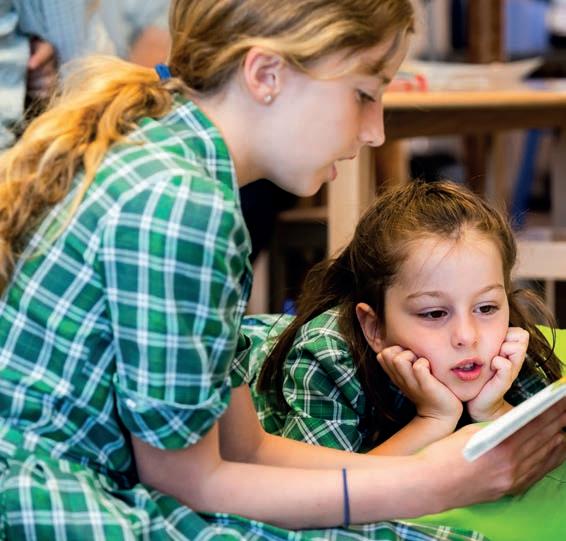
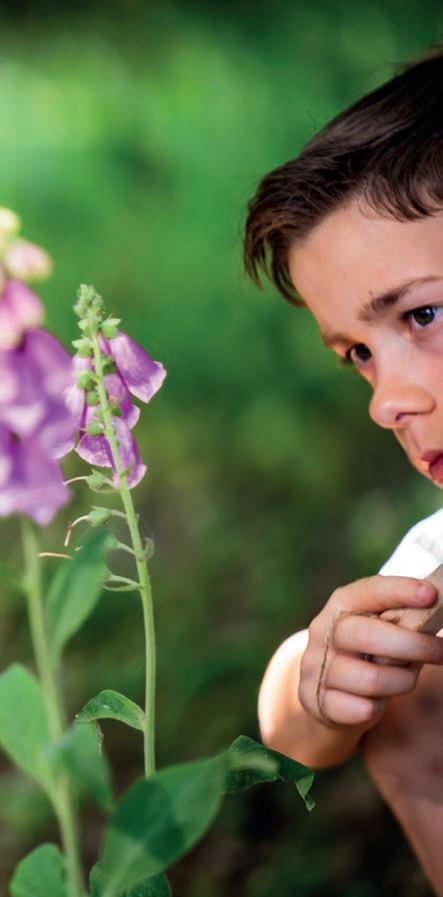
saving and spending. “During Enrichment Week Year 5 & 6 took part in ‘Money Matters Workshops’ with our Head of Economics. There was an introduction to managing money and investment beliefs, and a focus on financial budgeting and saving. Year 3 to 6 took part in ‘The Big (Little) Boat Build’ where children had to work to a budget and buy the resources they needed to build a boat which was fit for purpose.”

Linking practical and theoretical knowledge is key and is enabled by P4C (Philosophy 4 Children) sessions. “We have a ‘Curious Classroom approach’ and P4C helps to create that community of enquiry. The aim is for each child not to ‘win’ an argument but to become clearer, more accurate, less self-contradictory and more aware of other arguments and values before reaching a conclusion,” adds Sheina Wright.
PSHE lessons discuss active and passive listening, helping children to learn how to listen carefully and respond appropriately. These lessons are also used to give children the opportunity to discuss rights and responsibilities. This starts in Year 2, where children learn about rights and how to uphold these for themselves and others. By Year 4, children learn to draw on their own sense of right and wrong to help with making decisions. “Using some simple assertiveness techniques can help children feel more empowered in their

“Using simple assertiveness techniques can help children feel more empowered in their lives – and help them make safe choices”
lives – and help them make safe choices.”
Embley has its own Student Council, plus prefect roles and a buddy system. “It is important for children to understand that their voice can create an impact and make a change,” says Sheina Wright. This has been demonstrated notably this term with a new catering company at the school. Its ‘You said – We did’ whiteboard lets children add their own menu ideas.
The co-curricular programme is a cornerstone. “Giving things a go is not just about trying something once, it is important that even if it is out of their comfort zone that they give new things a ‘proper go’.” With everything from conservation and enquiry clubs to meets for film bu s, marine biologists and journalists there’s plenty to keep children engaged.
Literature and libraries are celebrated at the school, but traditional and modern
co-exist happily. “Children have an individual school iPad from Reception to Year 6, but it is always used to enhance rather than replace,” says Sheina Wright. She says literature-based and book-inspired English lessons give a grounding in quality drafting, writing and editing – whatever the medium. Both PSHE and Computer Science lessons focus directly on digital knowhow and staying safe online,. There’s a lot of scenario-based learning to help children consider problems they may encounter. “This allows our pupils to consider what may happen online and how they might respond appropriately and safely.”
Embley has strong community links –including with local care homes – to build a wider sense of responsibility. Residents are regularly hosted by Year 5 and 6 at school productions and always served tea and cake. “It’s a great relationship and we all love it,” says Sheina Wright.
Co-educational day and boarding school, ages 13-18
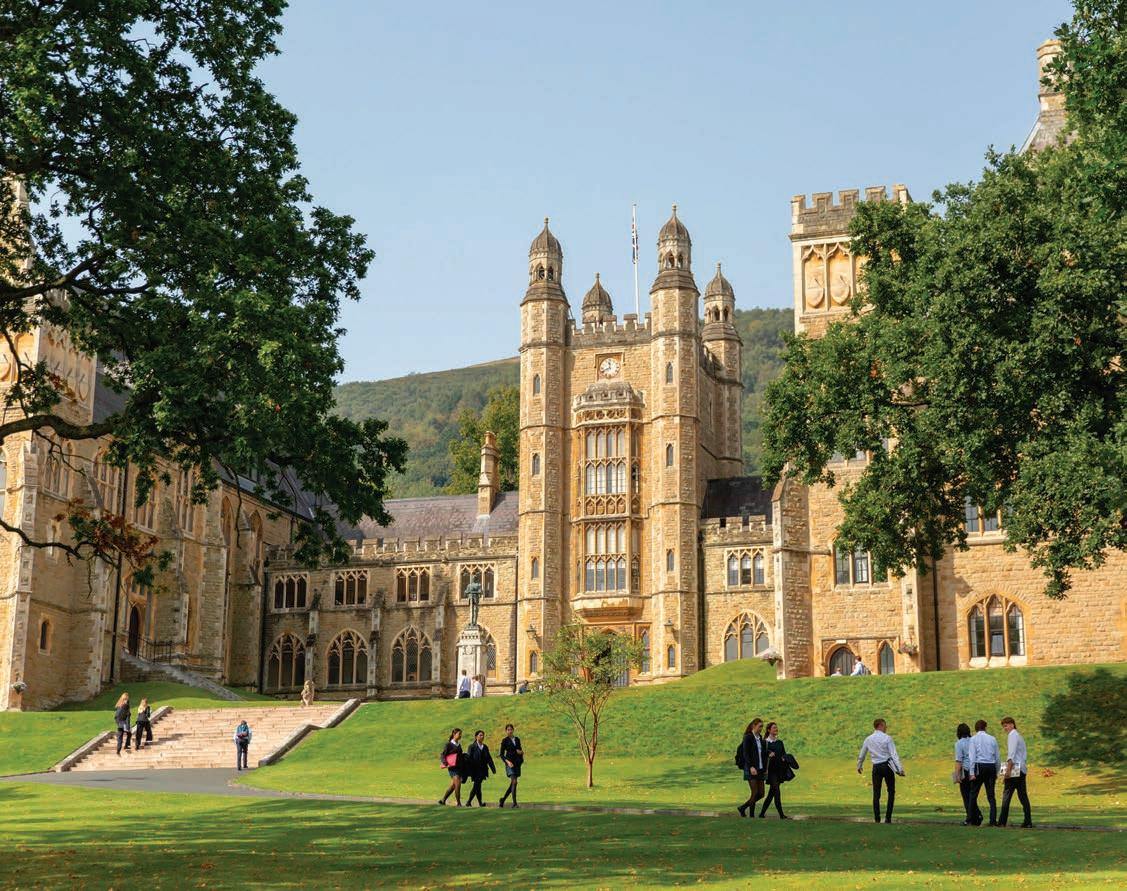
Malvern College, as one of the great English independent schools, provides young people with a happy and healthy environment in which to make their home. Pupils are empowered to thriveensuring that they are ready for the opportunities modern life brings.
Visit us and find out more:
admissions@malverncollege.org.uk
www.malverncollege.org.uk
Jonathon Anderson, Headmaster of Aysgarth School, on the true value of embedding life skills that help children connect, trust and become independent
Iam struck over and over again by how much thought and investment goes into the lives of our schools, both in the classroom and beyond. We continue to grapple with how we split our time across a range of subjects while still allowing space for sport, music, the arts and, of course, some time to be independent and to make choices.
On visits to senior schools, I have marvelled at science departments that look like universities and engineering departments using technology that makes my head spin. Sporting endeavours now come with a level of analysis and data collection that my own experiences at school simply could not match. Our pupils have a grasp of communication across the world that makes my childhood look very localised.
With all these impressive advancements and innovations, I am always left wondering about ‘life skills’ – what they really are, how we develop them and what value they have to young people of tomorrow. For me, life skills are about one individual’s ability to deal with others, one-to-one and as part of a community. They are, perhaps, part of a Venn diagram that doesn’t overlap too much with technology and is more rooted in intangibles: trust, feelings, independence, confidence, and so on.


“Some life skills can be planned and taught but many only become second nature when lived through school culture”
The recent focus on mental health might leave some feeling we have all gone soft, but the significant benefit I see is a willingness to talk, to enlist help and to trust. The point at which we follow this path will vary, but knowing it’s time to talk, that help is there and that stigma in this regard is all but gone better equips our pupils for the inevitable bumps in the road. We might take steps forward in confidence after public speaking, a moment on stage, a sporting victory or an improving set of grades, but talking, getting help and trusting are core confidences – the true foundation for these other experiences to add to.
I feel very conscious of the importance of the ‘preparatory’ element of
schools such as Aysgarth. In many cases, we are quite small, incredibly caring communities where pupils are known inside out. However, we prepare children for bigger stages to come, where life skills will be tested.


JONATHON ANDERSON Headteacher Aysgarth School
Having to consciously build a group of friends and adapt to a community, house, class and team is a new experience for many and, I would suggest, requires skills learned through PSHE lessons, boarding, positions of responsibility, collaborative work, school council experiences and time left to make choices. Some life skills can be planned and taught but many only become second nature when lived through school culture, minute to minute, with a set of values and expectations. Happily, I find myself in a place where trust has been actively developed through targeted interventions and forums and then reinforced through daily activities. While our grades are something to be proud of, it is the life skills that our pupils take into the testing times ahead that fill me with confidence that exciting, fulfilling, compassionate futures await them.



Ages 11 to 18 – Boys & Girls – Boarding & Day School
Set in 500 acres of Sussex countryside – 15 minutes from Gatwick Airport
www.worthschool.org.uk

Headmaster
Neil Brooks
Educating is an incredibly positive occupation. Schools, colleges and universities are preparing future generations, and it is human instinct to aim to better what has gone before. Society demands progression: better health provision; more e cient transport networks; secure energy supplies; increasing leisure access; clean, reliable drinking water; the list goes on.
Progress plays an enormous part in teaching. All stakeholders expect schools to facilitate progress at individual, group, community and societal levels when steering future generations. Naturally, that progress ends up being defined and quantified within the parameters of our current knowledge and will inevitably change as understanding moves on. Look, for example, at how fossil fuels expedited progress in the 19th century and how the Industrial Revolution was heralded as a new dawn for humankind. Now, we have tempered our enthusiasm for the internal combustion engine.
Artificial Intelligence presents a new revolution. Without doubt, and in a similar vein
to coal (no pun intended), oil and natural gas, its use will be hugely beneficial to improving the prospects and lives of many millions of people. In its relative infancy, the world is seeing huge advantages of AI applications –for instance, in healthcare to speed diagnosis. But history’s lessons should not be ignored and AI in schools should be managed with the mantra ‘everything in moderation’ at least until we all have a deeper understanding of its power and the possibilities of its influence.
Nevertheless, the sector will be doing children a disservice if it does not embrace the current technology and thoroughly explore its applications and possible benefits

in school settings. Many have long believed that education needs to move away from the rote learning of facts and figures of old – it has been a strain – towards greater critical thinking and the development of solutiondetermining skillsets. AI is an obvious catalyst for that move and could even make educational experiences more bespoke to individuals. The challenge will be in getting students to learn how to use AI such that it produces truths which can be ratified. They also have to learn how to feed it with quality information such that it produces worthwhile, applicable and relevant results.
Schools can embrace AI as a tool to enhance their o ering to pupils and improve educational standards, but there is much more to it than that. If the future sees Artificial
“Many have long believed that education needs to move towards greater critical thinking – AI is an obvious catalyst for that move”
Intelligence heavily threaded through our lives, then we must teach children to understand how AI works, steering them to explore possibilities for its application – just as successful engineers have adapted and applied the principles of past inventions.
AI will be innovating for the core aims of schools: teaching and learning. Surely, there is an additional expectation that it will change the way in which the school as a business is run, too, o ering potential e ciencies in administrative functions, documentation and communication.
That said, we must never lose sight of the fact that schools are about community, and it is people who must be prioritised.
NEIL BROOKS Headmaster Cranleigh Prep School
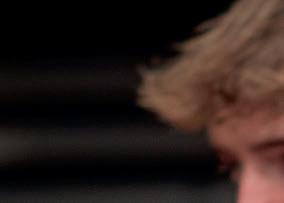
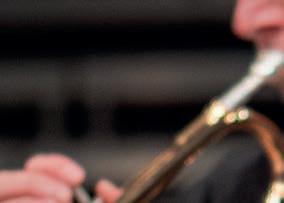













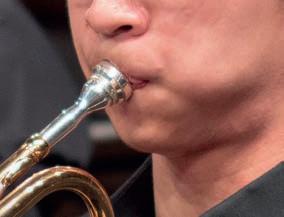



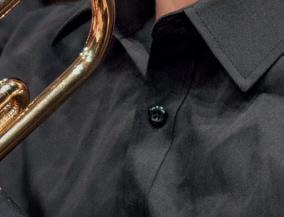






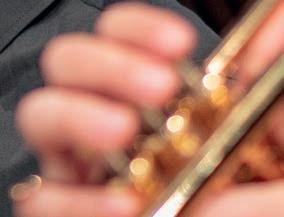


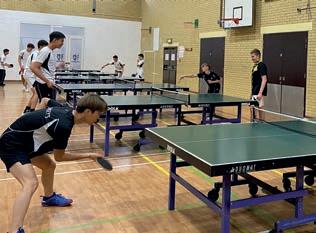


MADE REAL
Live science at DOYRMS
See page 44
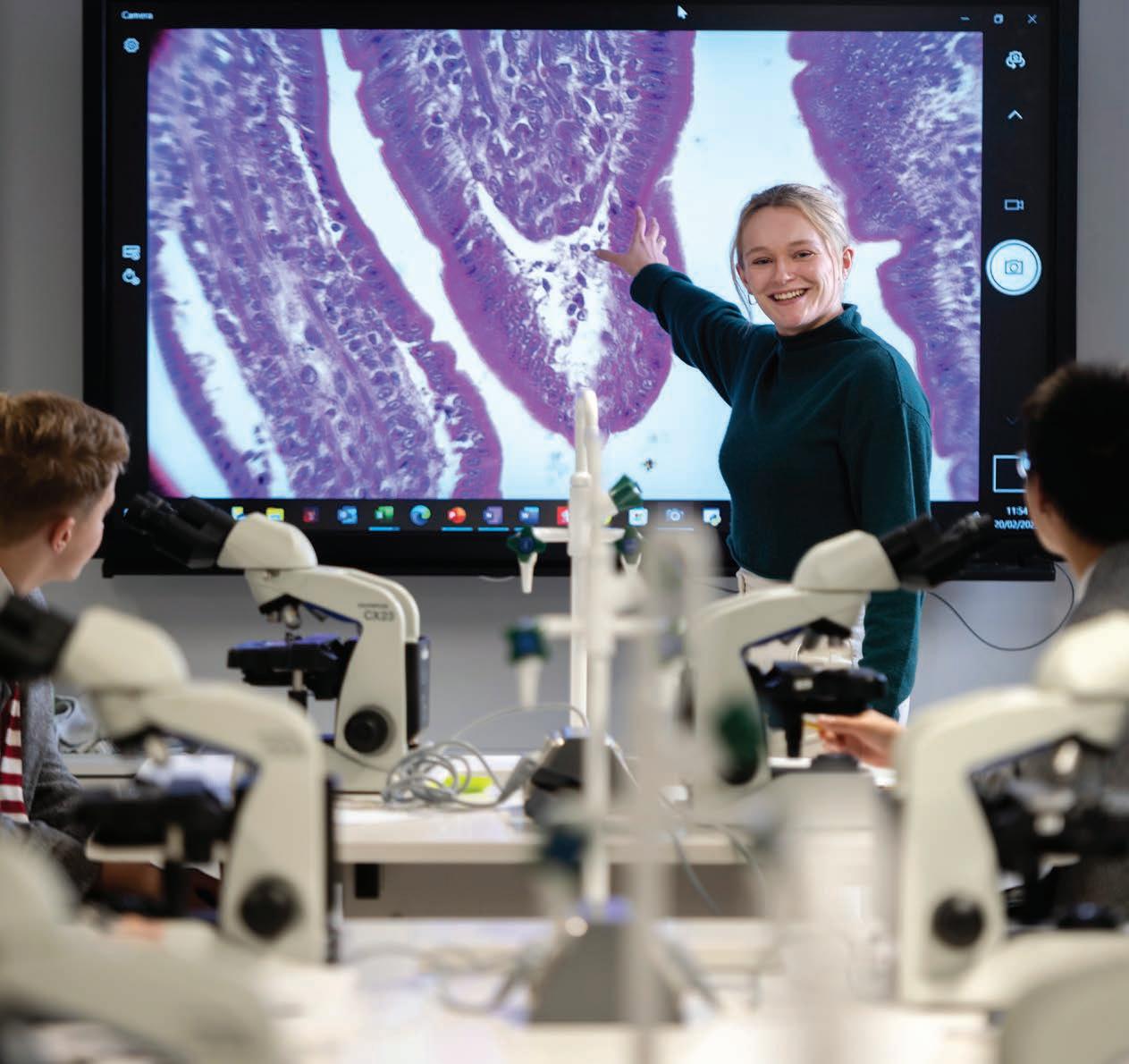
How do we deliver science and engineering subjects in a way that moves them beyond dry theory and into real life?
Absolutely Education speaks to leading schools building both broader understanding and scientific connections
At Tonbridge School in Kent, the £20m Barton Science Centre is a hub that makes STEM subjects come to life. Opened in 2019 and named after a Nobel Prize-winning alumnus, it includes 20 state-of-the-art classrooms andlabs across three floors. Practical and teaching spaces combine with libraries, a dedicated project lab, and interactive displays. With lots of whiteboards, the centre is designed with a focus on collaboration, says Head of Science Nick Waite.
“With the adage that ‘the most e ective way to test a student’s understanding of a topic is to ask them to explain it to others’,lessons will often include boys presenting their group’s work to the class.”
Feeding academic curiosity is crucial, so first-hand investigation and enquiry are prioritised. At Wednesday Afternoon Activities (WAA) Chemistry Research Group, for instance, Tonbridge boys joined forces with a local girls’ grammar to investigate Ionic Liquids. The group also visited Queen Mary University of London, where students prepared their IL samples for NMR and IR spectroscopy analysis. This was an object lesson in real-life research.
The Tonbridge Student Science

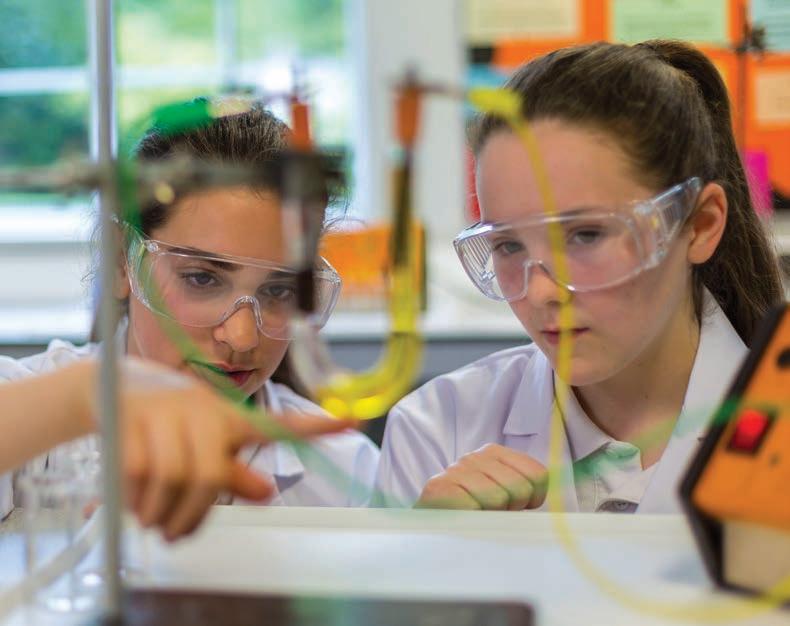
“Last year, more than 100 students from schools across the UK came together to share their research at Tonbridge School’s Barton Science Centre”
Conference, hosted annually at the Barton Science Centre, is an opportunity for students to present their research projects. Last year, more than 100 students from schools across the UK came together to share research. This was a full programme, with 50 student presentation sessions plus display stands created by pupils from as far away as Los Altos High School in California.
The school ensures a huge range of extracurricular opportunities to build connections between STEM subjects. Multiple science clubs meet during the school day – Astronomy Club do so after dark when members observe the night sky using the telescopes on the roof of the Barton. Nick Waite says it’s often the wackier projects that create the connections between science and life and spark deep curiosity. “When pupils are given the opportunity, for example, to design a rocket and fire it thousands of feet into the air at several hundred miles per hour, or to build an intricate puzzle box to stump the best ‘safe crackers’ amongst their peers, it creates a great sense of achievement and fun.
“A quote displayed in the Barton Science Centre sums up our philosophy on science enrichment activities: ‘Only attending the lessons is like opening a beer and just looking at it.Sure, you’ve made a start, but you’re missing the point...’.”
At Gordon’s School in Surrey, the team have worked hard to counteract the perception of science subjects as dry and ‘geeky’ and make them appealing to both girls and boys. It has worked, as STEM subjects are now attracting record numbers. This is also reflected in onward study choices, with science and health fields being popular university choices for all students.
The school says it has invested heavily in the infrastructure that brings science and engineering subjects to life, with a STEM hub, purpose-built Maths block (completed two years ago) and, even more recently, a Business and Computer Science suite. Another Science lab recently joined six others at the school and the Design Technology department has also been upgraded. “This is a new era for STEM at Gordon’s. We have invested heavily in the infrastructure and upgraded the facilities available as well as expanding what we o er to students,” says Deputy Head (Academic) Andrew Reeve.
In the early stages of a student’s journey through STEM at Gordon’s, the emphasis is on building their curiosity and engagement, also relating subjects back to everyday life. Making solar-powered pancakes or lava
“For Gordon’s younger students, creating solarpowered pancakes or learning how to make ice cream without a freezer have proved popular”
lamps in an after-school club, or learning how to create an endothermic reaction to make ice cream without a freezer have proved popular, unsurprisingly. Students in the younger years have also competed in the TeenTech Awards.
Older students are encouraged to develop their interests through cocurricular options such as Olympiads, CREST Awards, SATRO and Siemen’s competitions. A regular Inter-House Maths competition has joined the sports and arts competitions – adding to those mainstays of intra-school battles. Outside school, students have participated in the UKBC Biology Challenge. This tasks entrants to look beyond curriculums to other sources – including media and current a airs. And an all-female coding club won ‘Judges’ Favourite’ in the Global Innovators category of the Apps for Good Showcase with their food app that encourages healthier and less wasteful diets.
Andrew Reeve sees such student enthusiasm for science as hugely positive. “It’s an era of adventure and exploration within the curriculum and finding talent for something that the students can take further in life,” he says. “There are countless opportunities for students to go above and beyond the curriculum.”


At Heathfield School in Ascot, the focus is on a lively and challenging syllabus with strong connections to the real world.
Head of Science Lucy Johnson says it’s designed to inspire students to get a glimpse of the future scientists they could become. Enquiry and projects are incorporated into teaching and learning, engaging students and enabling connections across the syllabus, and with other subjects.
There’s a huge focus, too, on fun and practical experiments and investigations that relate things back to the real world and spark a spirit of enquiry. Over the past year, students have investigated whether co ee will help spring onions to grow hydroponically, built wind turbines and solar-powered phone chargers, tested the strength of dog poo bags, determined which crisps would be the best for lighting fires in the wilderness and
measured the concentration of catalase in di erent vegetables and hair types.
The Science Building at the school is designed to foster a ‘can do’ attitude, with the entire downstairs corridor displaying a photo-realistic mural of the timeline of scientific breakthroughs, with a focus on Women in Science – especially women of colour – within STEM fields. Lucy Johnson, who is lead in Biology as well as Head of Science, says: “Facilities in our STEM building include specialist laboratories for each science subject, supported by subject-specific technicians. This enables us to build practical work into our teaching and learning, so we can support tricky or abstract concepts with experimental work and demonstrations”. The aim is to replicate the environment students will encounter within science-based environments and professional labs.
STEM is also taken beyond the classroom and lab. “Every year we have a range of trips across di erent year groups. These may include a trip to the farm with the lower school, a visit to a gin distillery with
“Heathfield students have built wind turbines and solar-powered phone chargers and determined which crisps would be the best for lighting fires in the wilderness”

A-level Chemists, or the ever-inspiring Natural History Museum,” says Lucy Johnson. Tapping into both student interests and the future direction of careers, study of sustainability and the environmental impact of human activities is also prioritised. “A-level Biologists benefit from a residential trip to learn ecological and environmental sampling and study skills from the experts at the Field Studies Council. These trips help our students view science in a wider context.”
The Science team at Heathfield have been raising the profile of physics and engineering-related careers in recent years. Activities have included STEMKarts – with racetracks set up in the Sports Hall for a spot of high-energy racing with battery-operated go-karts. The fun is accompanied by serious science related to electric car technology, aerodynamics, design and sustainability. “This year we are entering the F1 in Schools UK competition and are planning to take a group of students to visit the McLaren Technology Centre,” adds Lucy Johnson.
There are plenty of extracurricular STEM-related activities through the year – from wildlife watching with motionsensor night cameras to dissection club and designing siege weaponry. Every year, the school hatches ducklings and one of the most coveted Science Club positions is duck monitor – caring for and teaching the brood how to swim. “Science really does come to life at Heathfield!” says Lucy Johnson.
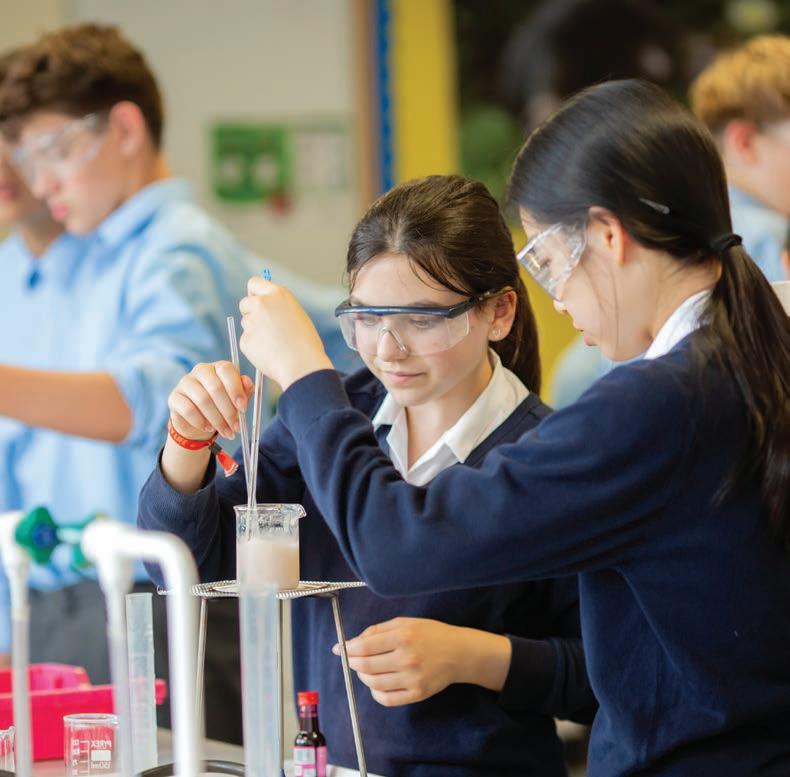
Malvern College, which sits in Worcestershire’s Malvern Hills, has a superb science setting in its state-of-the-art Science Centre, complete with multiple labs and prep rooms and a lecture theatre. With a full range of traditional science subjects on o er, there’s also a ground-breaking approach that brings STEM applications into the real world.
Young scientists at the school are asked to put their entrepreneurial hats on for the annual FY Challenge, which sees teams of budding scientists and inventors produce and market their own cosmetics brand. This is a challenge grounded in real-world industry because the UK health
“Malvern College’s FY Challenge sees teams of budding scientists and inventors produce and market their own cosmetics brand”
and beauty market is currently estimated to be worth £36 billion. With that in mind, Foundation Year (Year 9) students are tasked to look for an elusive gap in the market.
Malvern College sees this as a great example of inter-departmental working and sharing best practice, since Chemistry, Business, DT and Maths are all thrown into the mix – along with English, for good measure. The multi-day project this year kicked o with an insight into starting up an ethical cosmetics company, with a guest lecture by Old Malvernian Vicky Charlesworth, founder of JAYA Beauty. Further business acumen was then shared by teachers from English, Economics and Business who gave talks on ‘the analysis of advertising messages’, ‘what makes a good brand for a business’ and ‘pitfalls to consider when advertising in a di erent country’.
With target market identified, the challenge progressed to the Chemistry department where raw materials were waiting to be transformed into a skin cream and lip balm. The critical and most challenging part of the manufacture was to make an emulsion of the correct consistency to be used as a skin cream. Beeswax and natural oils were carefully combined to form an emulsion, and essential oils were then added for fragrance. Once satisfied, the UV absorbance properties of the
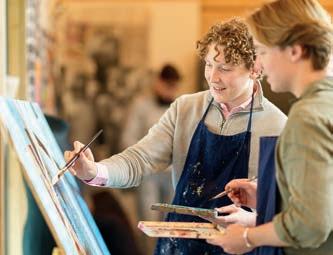






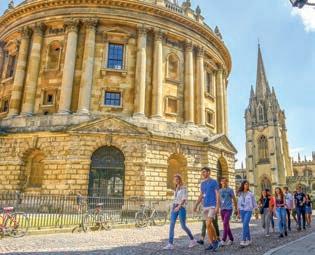
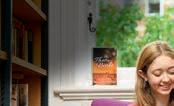



Ours is an education unlike any other in the UK. We believe that academic achievement matters and lays the foundations for prosperous futures, and that independence is the greatest skill a person - and a mind - can learn. St. Clare’s is a place for those who think differently. We help young people become academically successful, self-reliant, and aware of the world.

“DOYRMS students manufactured and tested WiFi antennas for Infineon Technologies, ensuring they were delivered on time and to client specifications”
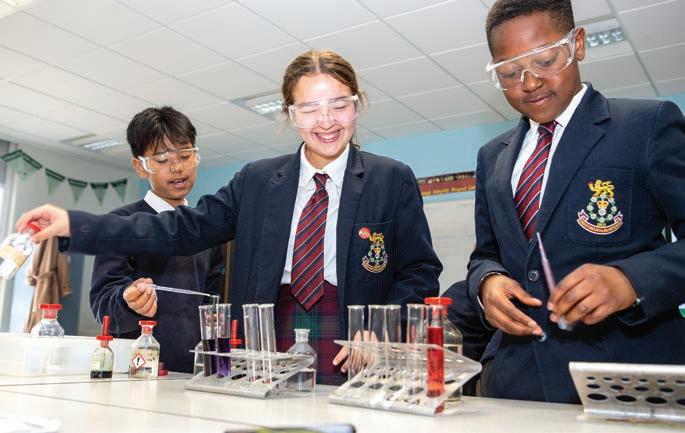
product had to be thoroughly tested. When the product had been manufactured in the lab, pupils return to the DT department to design and create their logo, packaging and pointof-sale display. The financial underpinning of their business plan was guided by the Maths department, who took the teams through costing and forecasting their business model.
The project, which happens every year over three days, compresses what it takes to bring a new product to market. From initial inspiration to the R&D process, pupils must also consider the realities of sales.
Every year, pupils produce a short video for social media, and an advert for the overseas market, while the final showcase pitch sees pupils present and respond to rigorous grilling in a Dragons’ Den-style session.
This annual challenge is included in all Year 9 timetables because it has proved to be an exercise that pupils find inspiring and exciting. Not only does it allow them to apply real-world scenarios, but they also develop presentation skills and learn to work as part of a team while honing high-level STEM skills. And who knows where this knowledge might lead them?

for Infineon Technologies, ensuring they were delivered on time and met client specifications. Students also go on lots of science and engineering trips. Recently, this included visiting CERN in Geneva. Activities outside the classroom and working with science and engineering institutions add invaluable real-life scenarios and hands-on experiences.
t DOYRMS in Kent, students (known as Dukies) have the option to study Engineering, Product Design and the Sciences, including Computer Science, across GSCE, BTEC and A level. The school’s recent £24.9 million refurbishment included the creation of state-of-the-art science labs and engineering and design classrooms. Students have access to equipment such as 3D printers, laser cutters, a chip forge and brazing hearth.
The school is supported by industry sponsors the James Dyson Foundation, Secondary Engineer and Infineon Technologies, and all three contribute teaching resources to build a real-world understanding of engineering and STEM practices. Recently, students manufactured and tested WiFi antennas
The school has an extensive cocurricular programme, with over 80 weekly clubs and activities, many of them covering science and engineering. Inspired by James Dyson’s story, the school works on the basis that engineers and scientists share common characteristics – thinking outside the box and perseverance. Teachers across subjects work together to ensure DOYRMS students’ understanding stretches across subject areas. Theories and knowledge learnt in the science classroom are often put into practice in engineering lessons, and vice versa.
With leading industry sponsors in the mix, students here take part in real-life challenges and create STEM products – some of which have even gone on to be used in industry and developed further. There’s lots of support from the school’s careers team, who help children unlock their interests and strengths when considering future opportunities.
Many students from the school have gone on to study engineering, design and the sciences at leading universities, while some have secured professional apprenticeships with companies such as Amazon in fields such as Mechatronics Engineering. The school prides itself on ensuring students are equipped with as much information as possible to make informed decisions about their future pathway, be it further study, apprenticeship or employment.
Join us at our next Open Event or get in touch to arrange your visit.

For more information visit: oakham.rutland.sch.uk

Arrange a visit to discover more about our high-achieving, co- educational boarding and day school, where pupils aged 10-18 learn, grow and thrive in the heart of rural England.
Scan to book your visit @oakhamschool

@Oakham

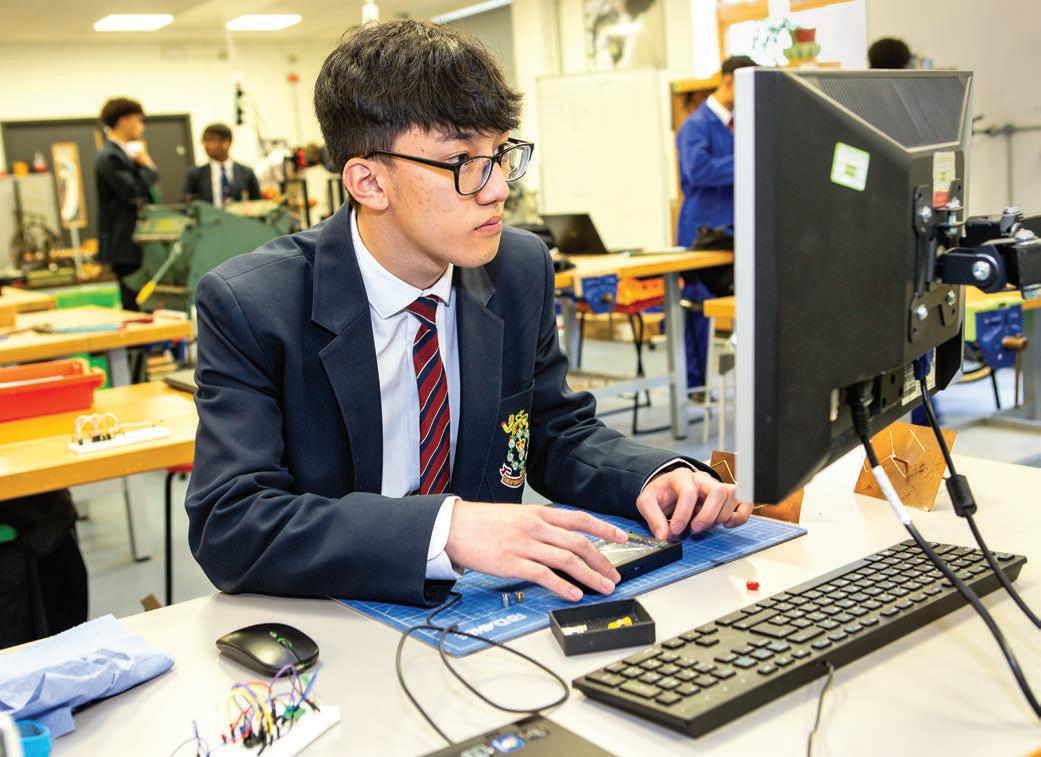
“Engineering-related projects at Pangbourne include the design and manufacture of an electric car, but also classic car restoration projects”
At Pangbourne College in Berkshire, live science means plenty of time for practical work. The outdoor classroom is a recent addition. Head of Science and Physics Dr Katerine Richard says this is particularly useful for experiments such as ‘whirling bung’ and messy jobs such as planting peas. “We place great emphasis on practical equipment being ‘old fashioned’ – rulers, stop watches, and
so on – through to cutting edge,” she says. “Pupils need a range of ways of interacting with the taught content.” This flexible approach extends to learning opportunities beyond the classroom. There are wholeyear-group trips to broaden everyone’s exposure to science. “At the other end, we provide opportunities for specific classes, groups of pupils or individuals –from external competitions or speakers invited to chat and answer questions with a single class to going out to support teaching of science in primary schools.”
There’s a vibrant extracurricular programme designed to work alongside
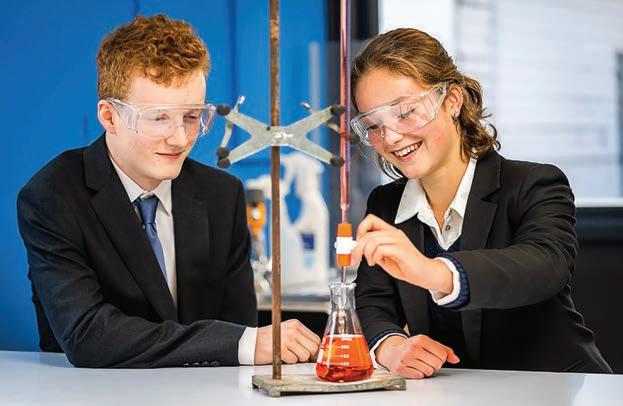

academics. Opportunities develop up the school, starting with Science Club for Year 7 and evolving into CREST Awards and the STEM Ambassador programme in Sixth Form. Pupil ambassadors support the Science Department and the school’s annual Science Week.
There’s lots of joined-up departmental thinking at Pangbourne – for instance a joint KS3 Science and Geography trip to see wind turbines and solar farms at work, followed by a sustainability survey at a nearby town.
Students also acquire strong practical skills via the Design Technology facilities. The large mixed media workshop develops basic hand skills in lower years, with increasingly sophisticated applications taught as students progress. The aim is to get their critical thinking to the stage where they can tackle a design and manufacture task from ideation to production.
Fun DT-inspired and engineeringprojects at the school include the design and manufacture of an electric car and classic car restoration. Everyone is looking forward to the national competitions promised in the future by the school’s emerging Electric Car Club. This four-wheeled challenge is a shining example of science being brought up to speed and into real life.

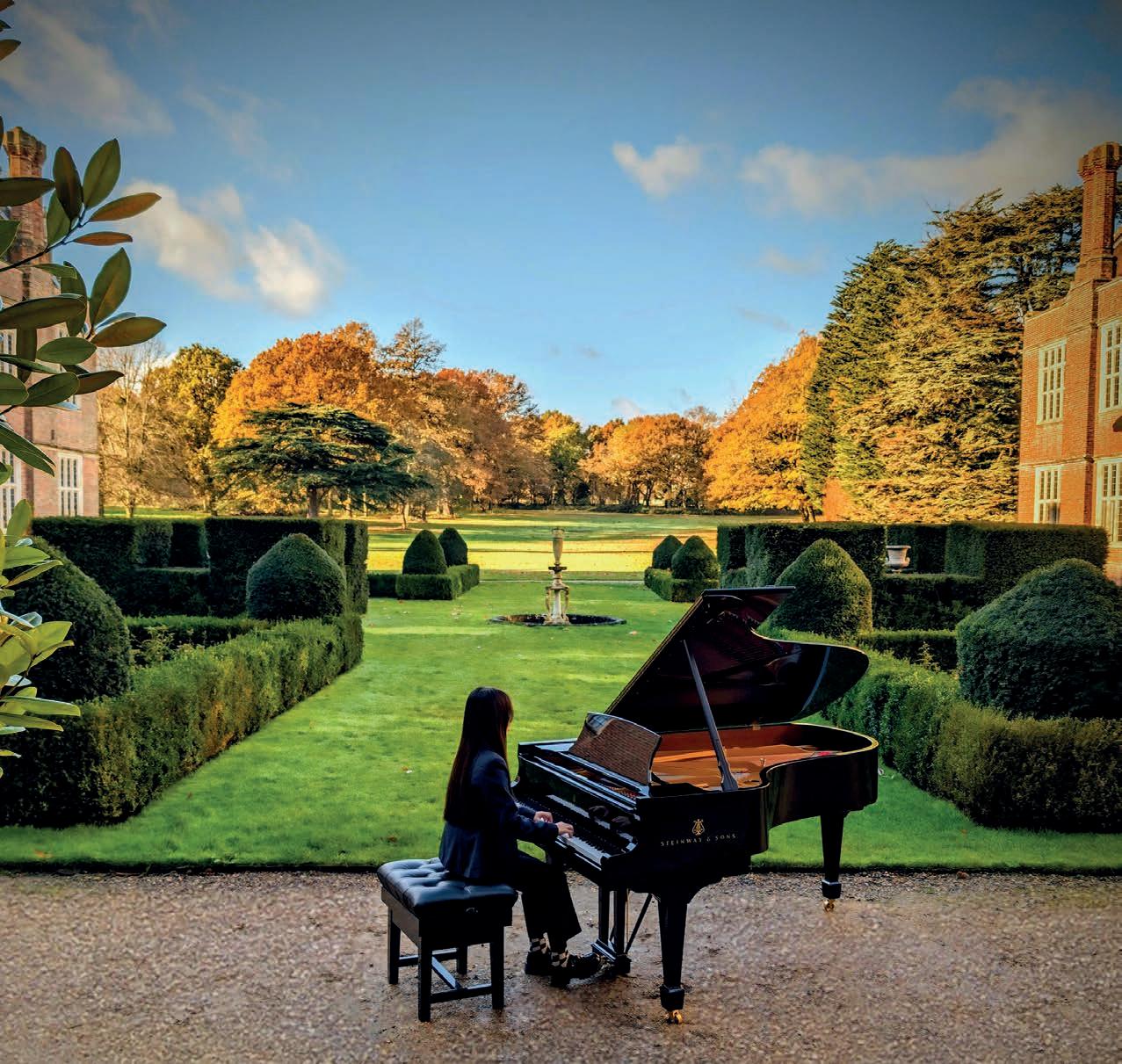
For girls aged 11-18
Co-educational Sixth Form
Welcome to Cobham Hall, a day and boarding school of untold opportunity, where centuries of history meet a curriculum for the future and creativity knows no bounds. Achieve more than you ever dreamed possible at Cobham Hall.
Prestigious Steinway Scholarship for pianists now added to the range of awards available.



The Principal of Concord College, on the need to support student’s complex problem-solving skills while also ensuring success in traditional exams
As an educator I feel fortunate to work with the bright and highly motivated children who come to Concord. I regularly consider whether the assessment systems we have, and particularly the exam systems we must work within, are doing their jobs properly. Are they assessing the skills that really matter in our digitally and globally connected world?
The World Economic Forum publishes a report called the Future of Jobs, which outlines the core skills identified by modern employers as of fundamental importance. In the 2023 report, we find in the top three places: analytical thinking, creative thinking and resilience, flexibility and agility. All these skills boil down to a common theme: complex problem solving.
Employers want solutions to real-life problems, and real-life problems are unpredictable, multi-faceted and dynamically changing things. Our pupils – the employees, entrepreneurs, doctors, economists and leaders of the future – will need to think on their feet. They must adapt to changing parameters, think creatively and be equipped with analytical strategies that break down a large problem into smaller, simpler units that can build towards to a full solution.
This is music to the ears of Maths and Physics teachers, who will argue, reasonably, that the realm of complex problem solving is exactly what their subjects involve. Beyond

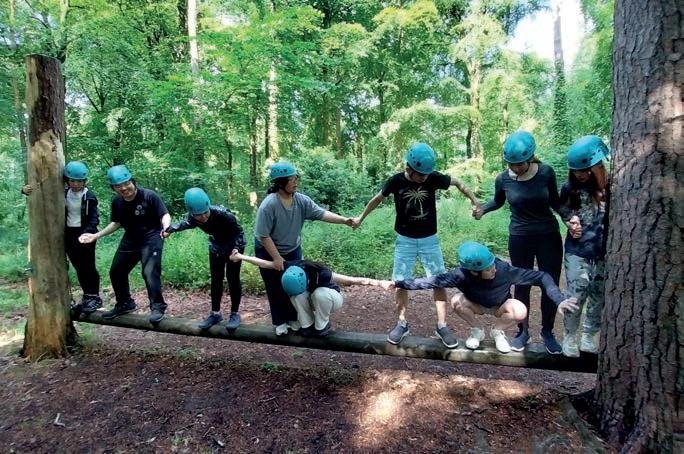
“The employees, entrepreneurs, doctors, economists and leaders of the future will need to think on their feet”
STEM, however, I can find important elements of complex problem solving taught across the school curriculum. From devising the staging of a play in Drama (and conveying abstract concepts or feelings) to learning lessons from history or considering how big data can influence geopolitical policy, our students are challenged to address hugely complex ideas.
To some, success at school might appear to require only success in a system of public examinations that test and reward recall of knowledge first and foremost, at a time when knowledge of facts is of

DR MICHAEL TRUSS Principal Concord College
declining value. I disagree, since I believe that the two are not mutually exclusive. Leaving aside the very important idea that a doctor, for example, still needs to understand and remember a huge body of knowledge and make life-or-death decisions – hopefully without the need to consult their mobile phone – exam-based curriculums are being developed to test and reward analytical thinking and unseen problem-solving. And guess what? These are the parts that even the most capable students can find di cult. At Concord we encourage participation in a wide range of super-curricular activities as well as concentrating on the more di cult aspects of the school qualifications. “How do I get an A*?’ is something we hear all the time. Our answer: practise the bits you find the hardest and value the other things you do. Subject-based Olympiads, performing in the College musical, debating in our Model United Nations competition, organising charity fundraising – they all matter. And, as they all involve complex problem solving, they will all contribute to that A*.




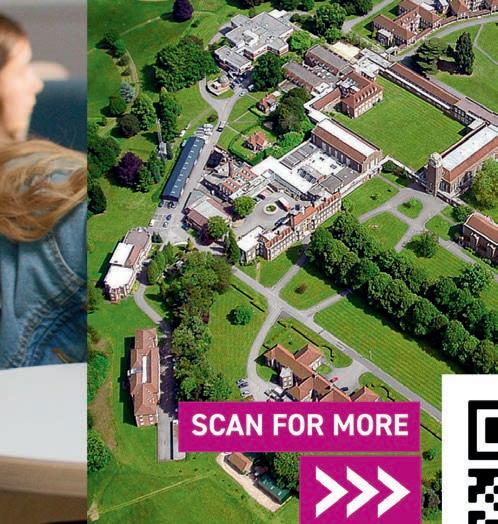




Duncan Reith, Principal of St Clare’s, Oxford gives a personal reflection on what to consider when it comes to making senior school choices
It remains a hard task for parents to find the best school for their child. But there are unexpected criteria parents might consider, as I learnt from personal experience. What did my wife and I get right in choosing a secondary school for our children? The usual checklist was in our minds: an academically rigorous school, plenty of individual support, a wide range of sports and clubs, and leadership development. These criteria worked. My younger son took a first-class degree from London and my elder son won a scholarship to study medicine at Oxford.
But these were not the only criteria that made the di erence. Some of the most important benefits happened more by accident. One benefit was attending a school close to a prestigious university. While their teachers attended educational research conferences, my sons got involved in project work alongside university students, understood in advance how university study works, and benefited from the public lectures. However, the most important accidental benefit was that they experienced a truly international education. At one point, we decided to teach overseas, and enrolled our children in an international school with students from 47 di erent countries. Here our children encountered cultures and perspectives from all over the world and developed tolerance and global understanding. What was remarkable was the e ect it had on their aspirations.
“If I were choosing a school for my sons again today, I would also look more closely at the quality of university guidance the school provides”
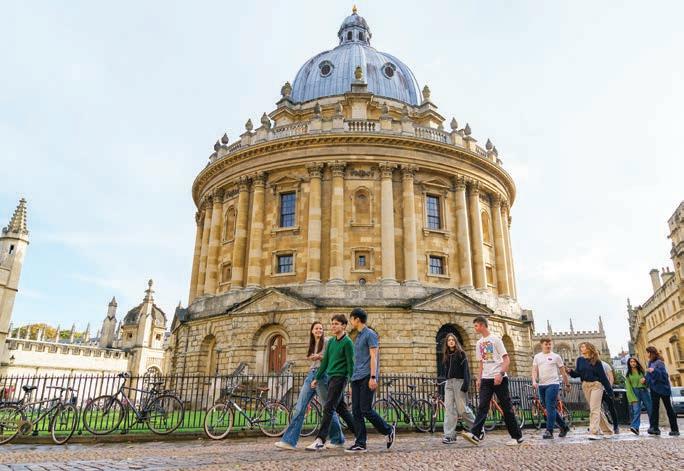
Today, I see this e ect at work at St Clare’s, Oxford, a school founded explicitly to bring students from di erent nations together. Our student cohort spans 50 di erent nationalities; young people develop a strong international awareness from their friends, from our curriculum and through events such as our TEDx conference on internationalism or our MUN conference. Many of our graduates go on to work for the UN or in international business, and over time we have become a popular school for the sons and daughters of diplomats and government ministers, as well as international business leaders, who see the benefits of a truly international education.
Returning to school choices, as parents we got things wrong too. My sons studied a British curriculum of GCSEs and A levels. I had not taught in an IB school then and did not realise how much broader and deeper an IB education is. While it is not the right curriculum for everyone, my sons would have benefited
from such a thorough education. St Clare’s, Oxford, is the oldest IB school in England and for decades has taught IB teachers from all over the world.
If I were choosing a school again today, I would also look more closely at the quality of university guidance the school provides. Because we have students looking to place themselves in leading universities all over the world, we need an expert team of college counsellors who can ensure our students gain access to where they want to go.
 DUNCAN REITH Principal, St Clare’s, Oxford
DUNCAN REITH Principal, St Clare’s, Oxford
Finally, everyone should look for a school where their son or daughter will thoroughly enjoy their experience and thrive. I cannot work out why the students at St Clare’s are the happiest I have yet come across, but my best guess is that it is the combination of the Oxford environment, an inspiring international education and the broad range of activities they enjoy in the company of a supportive network of friends from all over the world.

Throughout my 15 years as a pastoral lead in an all-girls’ senior school, I have witnessed first-hand the transformative power of all-girls’ education. The environment fosters a unique culture of empowerment, selfdiscovery and academic excellence, enabling young women to reach their full potential.
Recent data provided by the Girls’ Schools Association (GSA) has shown that students in girls’ schools consistently outperform their peers in co-educational institutions when it comes to academic achievement. This is attributed to the single-sex setting, which allows for a dedicated focus on girls’ learning styles and interests without the distractions and gender dynamics that can sometimes hinder them in co-ed settings. All-girls’ schools provide a nurturing environment where students feel confident to take academic risks and challenge themselves. They also pursue more STEM subjects, in general, than in co-ed settings.
At Marymount International School London, students are encouraged to celebrate each other’s triumphs, own their individuality and pursue their aspirations without fear of comparison. This supportive atmosphere cultivates a strong sense of selfbelief and confidence, empowering them to believe in their abilities and express their ideas with enthusiasm.
Our students show a fearlessness when tackling problems, whether in the
“By empowering girls to take charge, we provide a platform for them to hone their leadership skills and be role models for each other”
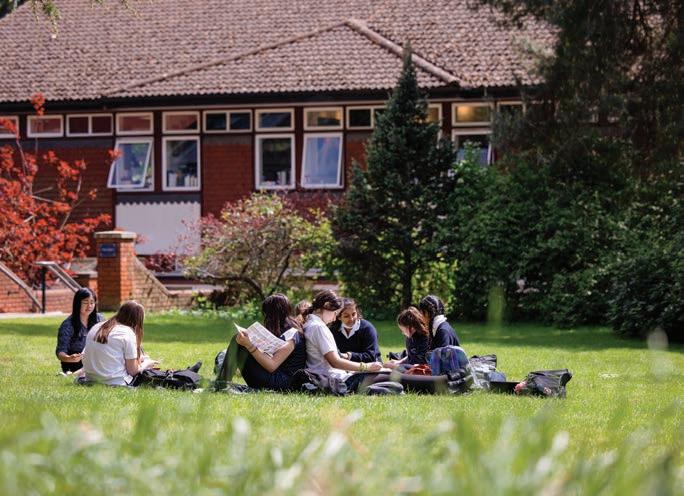
classroom or when considering global issues through Model United Nations or service programmes. They are praised for the sportsmanship that they show towards each other, which gives me great hope for what their futures hold.
By nurturing leadership qualities and empowering girls to take charge, we provide a platform for them to develop and hone their leadership skills, to be role models for each other and inspire those who come after them to be aspirational and inspirational. The emphasis on female role models and mentorship encourages girls to step up and take initiative, a mindset that prepares them for future success in their careers. As they build resilience and emotional intelligence, navigating life’s challenges is more achievable.
As to the question of whether girls are limited in a setting without boys, the answer is that we can be creative in our approach – finding ways for girls to collaborate with boys and yet maintain the academic excellence of their all-female environment. Marymount is part of a global network,
RSHM, which includes both all-girl and co-ed settings. This gives us opportunities to socialise and collaborate with boys outside of the school classroom through Sporting, Arts and MUN Festivals held in various schools around the world.
The challenges that young women face as they enter employment are still present in 2024. This requires a holistic approach to their education, where they are supported to be whatever they aspire to be. This enables them to hold their place in a world that will benefit from, the skills expertly nurtured by an all-girls’ environment.



We believe that every child has immense potential that, in the right environment, can be uncovered, nurtured and realised.
wellingtoncollege.org.uk
Co-educational excellence in the heart of Berkshire.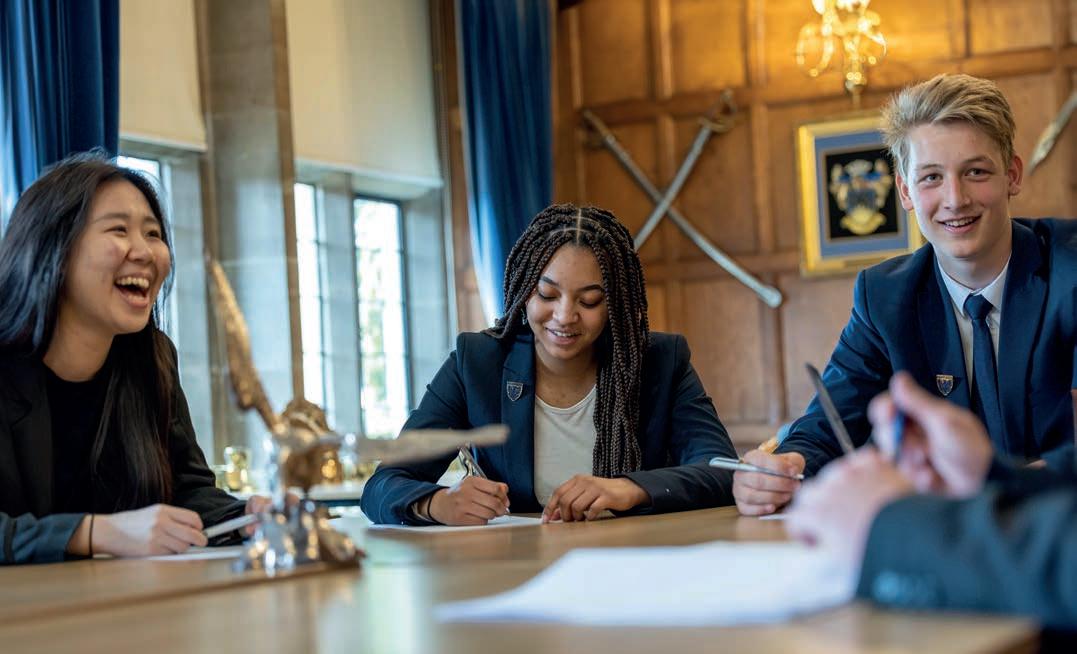






Queen Ethelburga’s Collegiate (QE) in York explains how its campus built on choice creates well-rounded, future-ready students
An education at QE is all about learning through experiences, trying new things, and discovering what you enjoy and excel at. Students choose from a wide range of subject options and are encouraged to try extracurricular activities which enrich their education and enable them to become more well-rounded individuals. There are more than 100 clubs for students to get involved in, including Mandarin, Games Design, Home Economics, Woodland Sessions, and Esports, as well as more traditional options such as Art, Dance, Design Technology, Drama,
Gymnastics, Music and both competitive and recreational sports clubs. We have academically focused clubs in Medicine and Veterinary, Journalism, Law, Enterprise, History, Politics, Psychology, and Philosophy, which better prepare them for university applications and further education.
QE seeks out the most enriching opportunities for our students. That is why we became the first ever UK school team to participate in the Student Motorsports Challenge and why our students had the opportunity to work with professional music producers Billen Ted to create and record the hit song, ‘Feels Like Home’. As well as composing the melody, creating
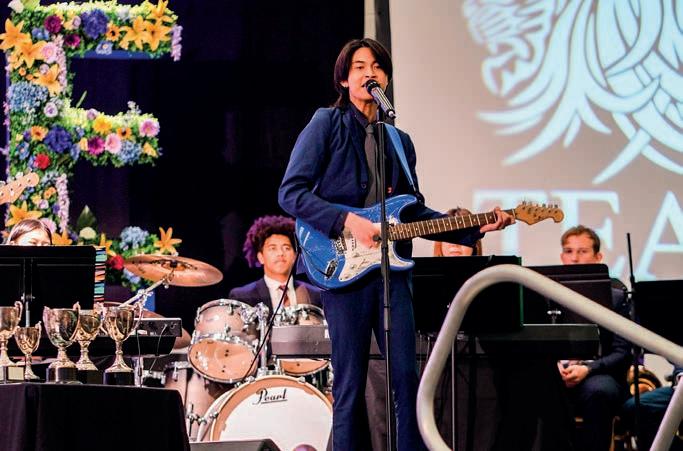

lyrics, singing and playing instruments, students created the choreography for the music video. All recording and filming was done on-site, making the most of our state-of-the-art facilities and 220-acre site.
Those interested in STEM can benefit from the Practical Science CREST Award, Critical Thinking Club, Advanced Mathematics Club, and the internal Medical Conference Competition. Students can join annual QE Volcano and Bath Bomb Days and send items to space as part of the Mars Balloon national initiative.
The QE Stretch and Challenge Programme encourages students to seek opportunities that foster a lifelong passion for knowledge. This includes attending industry professional and alumni lectures, entering internal and external competitions, work experience, volunteering, and partaking in both personal and group research projects. Students can also become representatives and leaders in a variety of roles throughout the school that allow them to grow in confidence whilst developing core collaboration and leadership skills.
Nestled in 220 acres of North Yorkshire countryside, QE is a co-educational day and boarding school for students from 3 months to 19 years. admissions@qe.org qe.org
Putting all children into one rigid box can be stifling. But when learning revolves around them instead, they get the space they need to truly flourish.
The traditional path of fixed schedules and standardised classes has, indeed, guided many students to bright futures. Still, there’s no denying that it’s not the right fit for every child — nor is it the only way to achieve success. We are firm
believers that more flexibility can clear the way for students to achieve their dreams, and as an online school, we’ve seen the power of that approach first-hand for over 18 years. Take the worldwide accessibility that comes with flexible online learning: regardless of their location, students can now access the very best of education from anywhere. Gone are the days when boarding schools, international moves, and lengthy waiting lists were the only options for accessing a British
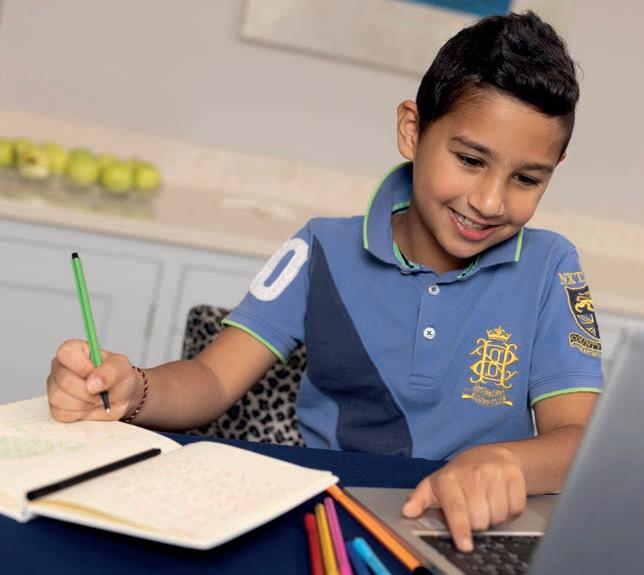

education, for example. At King’s InterHigh, we bring the British and IB curricula to students in over 130 countries, from the UK to the UAE and as far as Southeast Asia. Naturally, being able to pursue worldrespected qualifications is of great benefit to international students aiming for top universities and careers. But the geographic diversity this flexibility creates also makes for an incredibly enriched learning experience. A geography lesson may be brought to life by photos from a classmate living in the Alps, while any group project is enhanced by the vast range of cultural perspectives shared. Collaborating with global peers opens students’ eyes to a new world of understanding.
Hand-in-hand with collaboration is friendship. Despite the misconception that online schooling is isolating, flexibility can actually give rise to even more social opportunities. For one, students with flexible timetables have more time for inperson activities. One of our own students, Alexander D’Cruz, spends much of his time between classes in athletics training in Dubai. Plus, on top of that, there’s the chance to network and build bonds with students around the world in school. Our own learners may meet fellow online school families in their local areas one day, then have fun in one of our virtual clubs the next.
The low-pressure, inclusive environment of online schooling can also be a gamechanger for students who struggle to socialise in traditional schools (for example, those
ABOVE
Flexible learning with King’s InterHigh
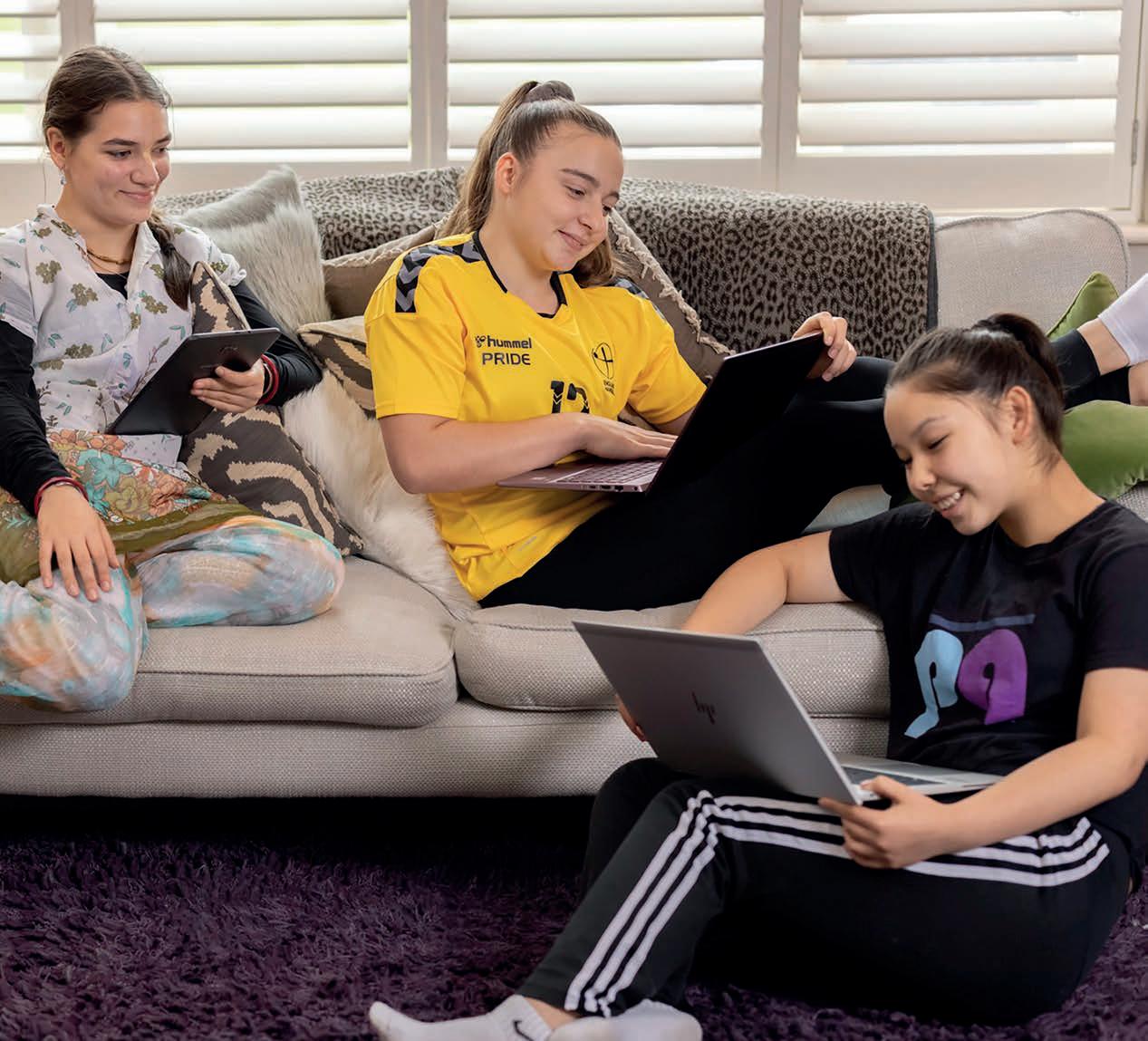
“Despite the misconception that online schooling is isolating, flexibility can actually give rise to even more social opportunities”
who are neurodivergent or struggle with anxiety). This, too, is another area where flexibility can help propel students of all needs on their way to success.
Everyone learns best at a di erent pace, but no one can deny the benefits of learning interactively in a classroom. With flexible learning, neither has to be sacrificed. At King’s InterHigh, students join live classes each day, but every lesson is also recorded to view at any time. A learner with ADHD
who struggles with memory, for example, can revisit a lesson (along with all the valuable input from their teachers and classmates) whenever they need to, instead of falling behind when new topics come up in class.
While school is arguably the most important part of any child’s pathway to the future, experiences outside the classroom are crucial too. Take the student who needs time to train to pursue a sports scholarship at any Ivy League college, or the teen who
wants to shadow doctors during their workdays to prepare for a medical degree.
With the ability to watch lessons at any time, they can fit a quality education around their endeavours, from activities to internships to enrichment trips. As an example, alumnus Thomas Ralfs told us online learning was special to him because he was able to achieve all he did without giving up time spent on his love of mountain running. Thomas achieved four A*s at A Level with us and went on to the University of Cambridge.
Ultimately, with a flexible education, students have no limitations. They can enjoy a world-class education and everything school has to o er while maintaining their wellbeing, building lifelong friendships, and pursuing their ambitions. It’s a recipe for long-term success and future achievement, and we’re delighted to be uniquely placed to bring that to families at King’s InterHigh.

With a location in prime Sussex horse country, Hurst College is expanding its riding and training opportunities for pupils – from grassroots up
Ponies and children can be a sparkling mix, and Hurst College is well aware of the value of riding in building confidence and skills – alongside sporting prowess. The school has a huge advantage here – it is just down the road from Hickstead, home of the All England Jumping Course. Indeed, the school relationship with this worldfamous centre began many years ago; it held the first annual Hurst College National Schools Jumping Championship in 1964.
There have always been good and very good riders at the school, and the arrival of Head of Equestrian Tracey Pargeter some 18
months ago has seen opportunities step up. With vast experience and a background in The Pony Club, plus a strong commitment to growing all levels of riding, she is developing equestrian opportunities through the school – and the numbers are growing. "We've got all abilities. Starting o with grassroots with the children in the Prep right up to the older children – and some competing and even representing Great Britain."
The number of riders competing is particularly good news. The school fielded over 20 in the National Schools Equestrian Association (NSEA) championships last October, where previously there had been eight competitors. Recent school achievements have incorporated CCF

"It's not all about riding – it's the whole package I'm trying to get across. It's learning how to look after horses"
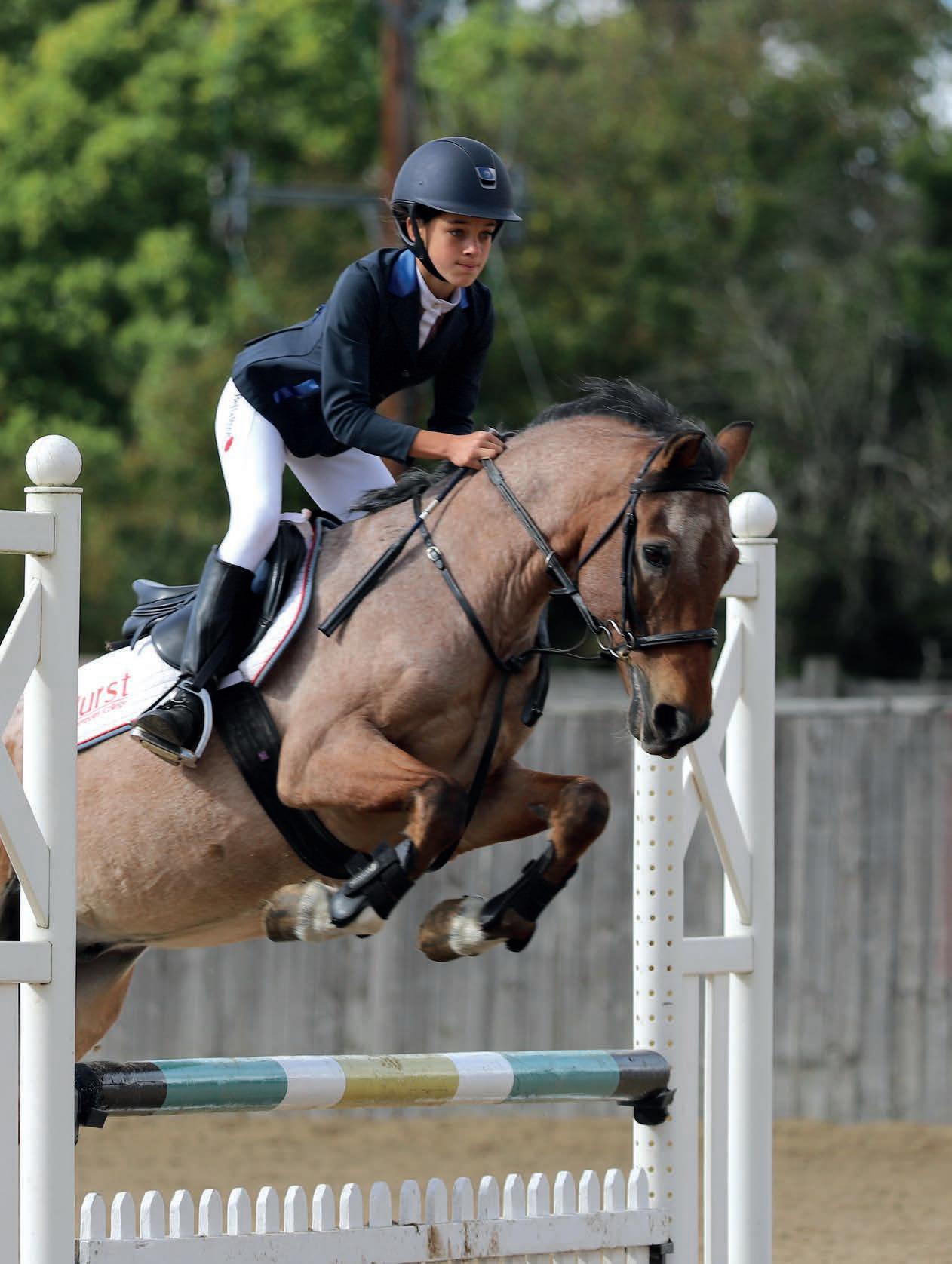
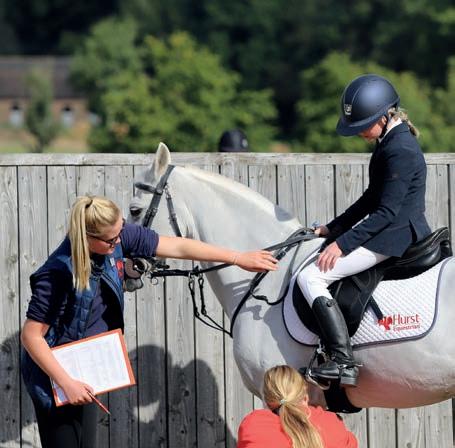
(a strong element here). The school was invited to nominate one pupil to go to the Cadet Forces Military Equitation Competition at Windsor last year. "At this competition they were shown how to ride a military horse if they were on parade. They then had to ride one of the military horses and be judged," says Tracey Pargeter. "Harriet Birkby won this for Hurst out of 20 pupils!". She was equally thrilled when a school military service team competed at the Royal Windsor Horse Show in May. It not only won its section but also came second overall – and with awards presented by both the Duke of Edinburgh and the King of Bahrain.
Training takes place at the school every Thursday afternoon, with a focus not just on jumping but elements such as dressage and flatwork. Also included are talks and training

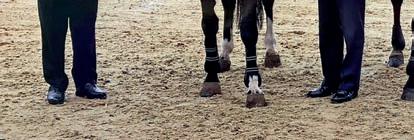


"Riding is a sport children can do well and achieve in. I don't mean by winning or getting to the Europeans, but by achieving their personal best"
sessions by elite riders to explain more about the hard work involved in competing and getting to the top. The children have had the opportunity to visit Shane Breen's stud, both to see the foals and to find out about artificial insemination of horses. "It's not all about riding – it's the whole package I'm trying to get across to them. It's learning how to look after horses."
There's been a fascinating visit from an equine vet and – during a pony camp held over four days in April – insights into the 'hard graft' of stable management and other important aspects of being a responsible rider and owner. At the moment, Hurst riders need their own pony or horse – some pupils stable them at nearby liveries but a lot more ponies turn up on a Thursday afternoon. BELOW

This means that pupils e ectively enjoy their own in-school pony club training sessions with their friends and fellow pupils. And, of course, pony mad boarders get to see their much-loved steeds.
Equestrian is something the UK does really well, so heartening to see hard work to develop the next generation of potential eventers, Olympians, racehorse and stud owners. But for every level, Tracey Pargeter sees a huge value in equestrianism. "I've noticed this over many years. For children who aren't doing as well as they could at school, for whatever reason, it definitely helps them. You can praise them, and they can feel good at something."
Self-confidence in one area tends to build confidence across the board. She's seen this among some of her youngest pupils already. "I've seen huge improvement from a little girl last year with a new pony – she was terrified to come o a lead rein at first. Well, she's jumping round the course now, a year on, and the improvement is amazing. It's so rewarding to see.
"Riding is a sport children can do well and achieve in. I don't mean by winning or getting to the Europeans, but by achieving their personal best," she adds.
"We do quite a lot of team competitions. Sometimes you have a good show and sometimes you might be the one in your team who knocks poles down or doesn't get the best dressage score." Children become team players through this process, and pick up great lessons in resilience. "As a team, they all encourage each other, and they know sometimes they won't do well and sometimes they will – it's what happens in life."

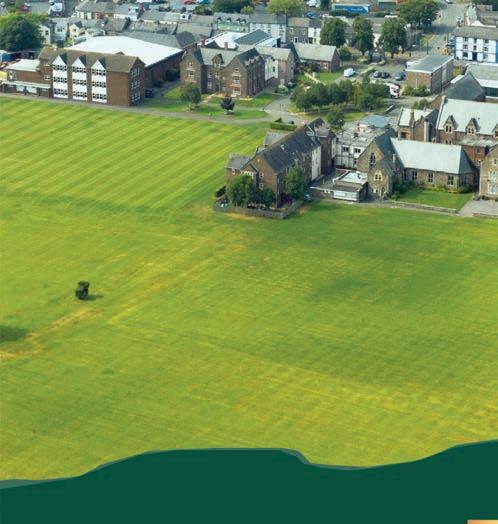









The new school year began, predictably, with a heatwave – and just as predictably, with university Open Days, the (new look) UCAS form to fill in and choices to make for our Upper Sixth students.
Within the independent sector, Higher Education choices have traditionally been, well, very traditional. ISC research over the years from 2010-2020 showed almost all of the school leavers from HMC and GSA schools choosing a tiny proportion of available courses at a small proportion of (mainly famous) institutions. Indeed, the only movement in the statistics for some years was the occasional swap in first choice university between Bristol and Exeter. And on the (probably still ubiquitous) Honours Board, the gold standard has been the Oxbridge o er.
But perhaps no longer. The steady growth in applications to US universities has been well-documented, particularly at the most academically selective schools. Here at
Whitgift, growth has been steady, but really hit home to me only last year, when one of our school captains turned down his Oxford (Languages) o er in favour of Stanford.
According to the Times Higher Education rankings, seven of the top ten universities and 13 of the top 20 are in the States (three and three in the UK) so this is perhaps hardly surprising. And, of course, the universities increasingly being considered by discerning students are not only in the US. McGill and Toronto in Canada are being talked of more, and rightly so. This year, to me even more startlingly, one of our students turned down a Cambridge Computer Science place in favour of the University of Michigan. Apparently, it is theplace to be for coding.
Why? The prevalence of scholarships is a big driver, as is the well-known American and Canadian admiration for the


all-round applicant – the embracing of sport and music and drama in a way now foreign to Oxbridge. And access, it goes without saying, to some of the greatest minds and thinkers. Perhaps the leading academic working in translation, David Bellos, is no longer at Manchester, but Princeton. The tradition of Liberal Arts and the broader degree plays a part too – and perhaps a bolder, more confident generation. I’d like to think so.
Oxbridge (and UCL, Imperial and many other selective universities) are, of course, fabulous institutions. But Oxbridge has a very simple problem: static student numbers,
“One student turned down a Cambridge Computer Science place in favour of the University of Michigan – apparently, it is the place to be for coding”


since Colleges, rightly in my view, retain the residential, tutorial vision despite steeply rising applicant numbers. Quite simply, it gets tougher every year. Is there social engineering? I still think the jury is out, although ‘access courses’, competitions from which our students are excluded, and contextual data use are definitely edging out many great independently educated candidates.
Maybe it is a simple shift. As the UK forges a more independent path, our young people are becoming more international, broader-minded, braver, more independent. That has to be a very good thing.

The Leys School Cambridge. Business Studies Lead. Studied Business at University of Sheffield and PGCE Secondary Business at Warwick. Beyond teaching, worked as Executive Assistant to the Head of Workforce for NHS East of England and Project Manager for the Association of Directors of Public Health.
From start-ups to global corporations, the world badly needs smart thinkers and doers to create, innovate and generate prosperity. Two experts in the field give their elevator pitch for why Business is a subject worth studying, and where it can take you

Reed's School, Cobham Business and Economics teacher. Studied Business Management at Kingston University and has a Master’s in Teaching and Learning. He is most fond of Business Strategy and enjoys teaching students the skills of enterprise and how best to develop their inner entrepreneur.
What makes Business so brilliant?
ST: Businesses underpin the success of economies around the world. In an increasingly connected world our interdependence for economic growth has come to the fore and demands our attention. Future economic success will be driven by individuals who possess a deep understanding of business principles and practices.
EF: The business world is increasingly dynamic as it grapples with an everchanging external environment. Students of Business are provided with the opportunity to develop critical thinking, problem solving, and time-management skills, all set within topical business scenarios.
What made you choose it?
ST: I connected the importance of choices that individual business owners make having a ripple e ect on the macrocosm of their society.
EF: I really enjoy helping students develop skills they’ll be able to use in real life. Enhancing their career capabilities is one of the great joys of teaching this subject. Also, I’m a big Dragons’ Den fan!

FAMOUS BUSINESS STUDENTS: Mick Jagger, Cate Blanchett, John Grisham, Kevin Costner, Konnie Huq
5 TOP SPOTS FOR DEGREES: Warwick, Bath, Leeds, Loughborough, London School of Economics
WHERE BUSINESS BRAINS
HANG OUT:
Home Grown in Marylebone – members' club for the entrepreneurial set, and with actual Dragons among its ambassadors homegrownclub.co.uk

Transferable skills and knowledge acquired?
ST: Business students develop a diverse skill set. Financially literate, they also become skilled communicators, critical thinkers, problem solvers and decision makers.
EF: Students gain a whole suite of sought-after transferable skills including numeracy, communication, data handling and entrepreneurial skills.
"Students of Business develop critical thinking, problem solving, and time-management skills – all set within topical business scenarios"
What pathways does it open?
ST: Employers seek well rounded individuals who have the skills and attributes to excel. Business courses are designed to develop these skills and the confidence to tackle new challenges. Whether choosing a university course, exploring apprenticeship schemes or diving straight into working life, Business is a great foundation.
EF: Business is a pragmatic subject which can lead to a variety of pathways. Business students can expect careers in any of the key functions of business such as Marketing, Human Resources, Operations and Finance. School leaver and degree apprenticeships have also become popular in recent years.
2 things students may not realise Business covers...
ST: Infographics, a picture says a thousand words while a chart in a financial paper can create a perspective that may doom a business or propel it to glory! Cartoons – Dilbert is a personal favourite.
EF: Business ethics – acceptable behaviours within business, such as fairness, respect and integrity. Also Corporate Culture, the values that characterise an organisation and guide its practices




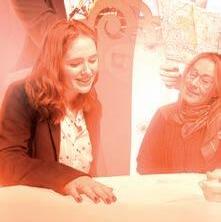
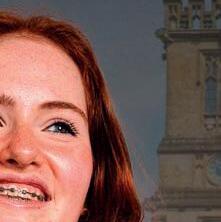


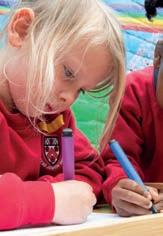

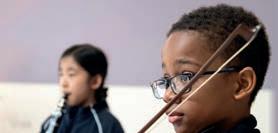
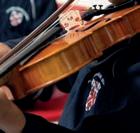

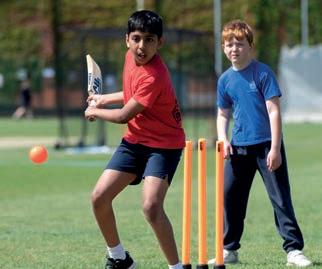










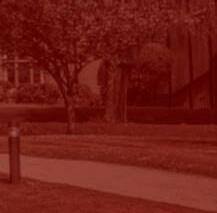



The Head of Royal Masonic School for Girls on why newspaper league tables are not the wisest measure of school performance
Each year, newspapers publish annual ‘League Tables’ of how UK schools performed in the summer’s GCSE and A-level examinations. Most headteachers are not fans – and this includes headteachers of schools at the top of these lists.
It’s not that we are concerned about where our school is positioned (and I write having worked at a couple of schools that were always placed highly in such lists). It is that, as Heads, we know that league tables based on a school’s raw grades (counting how many A*s were achieved at A level or 9s and 8s at GCSE) only really tell us how academically selective a school is. Schools that are more academically selective at age 11 and 16 will invariably be the schools that sit at the top of league tables of raw results each year. No s..t, Sherlock!
Many Heads see their publication in newspapers as unhealthy and unhelpful, an insidious part of a culture that encourages parents to equate the ‘best’ schools with those that have the most A*s or 9s. It is a culture that has even, on occasion, led to less able but hardworking pupils not being entered for examinations by their school because this is the crudest lever to pull in order to climb such league tables.
A more accurate, and healthier, way of assessing the academic progress of students in a school is the ‘value added’. The Centre for Evaluation and Monitoring
“Value-added data enables schools to receive just as much credit for a less able pupil who achieves higher than expected grades”

(CEM) was established at Durham University in 1983 and is the largest educational research unit in a UK university. CEM works with UK schools, colleges, education authorities and government agencies to provide scientifically grounded research that monitors every school’s academic performance.
Students sit baseline tests for CEM at ages 11, 14 and 16. Having amassed 40 years of this assessment data, CEM is able to give each child a scarily accurate predicted grade for every subject and can then standardise each school’s actual results in order to tell us how far above or below the predicted grade a student is. From this, CEM can provide evidence of how much value each school adds academically.
Every independent school that I have worked at over two decades uses CEM data internally to assess its own academic progress at both school and department level. It is a standard aspect of the


department reviews written every September in schools. From our CEM data this year, I can see that RMS sits on the 92nd percentile of all schools and the 87th percentile of all independent schools for value-added performance. In other words, we add more value academically than 9 out of 10 schools.
CEM’s value-added data enables schools and departments to receive just as much credit for a less able pupil who might have been expected to attain a Grade 4 but achieves a grade 5 or 6 at GCSE as a more able pupil expected to attain a Grade 7 who achieves a grade 8 or 9. This is just how it should be, of course.


Value added is the most important metric because it reflects the extent to which all pupils are achieving their potential. Unfortunately, it is not what is published in your Sunday newspaper each year, so perhaps we should all be questioning what value is actually added by looking at newspaper league tables of raw results
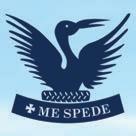
NURSERY - JUNIOR - SENIOR - SIXTH
“There is a very strong sense of community in the school, particularly in the boarding houses, and pupils are noticeably proud of the strong family atmosphere.”




Outstanding co-educational day and boarding school for ages 2-18 years old. Stamford is set within exceptional grounds, right in the heart of historic Stamford, Lincolnshire.

Looking forward with confidence, looking back with pride
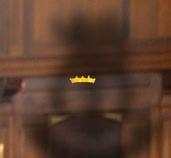
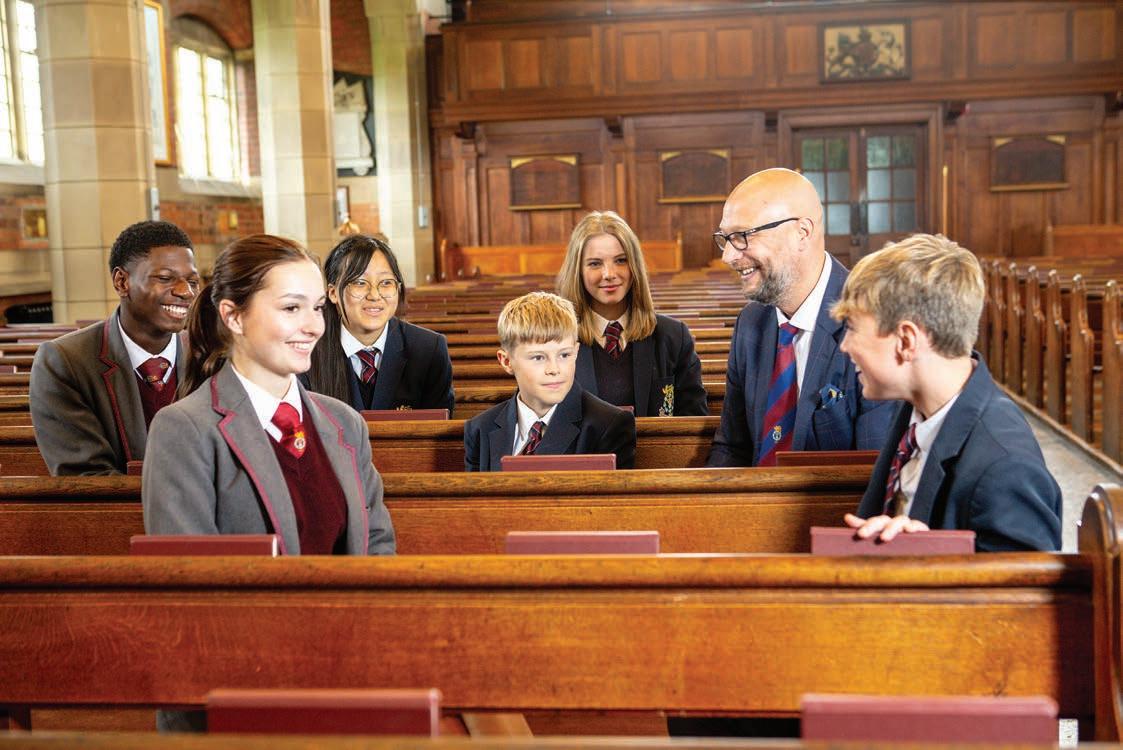
ISI Inspection Report For more details scan our QR code to visit our website or contact our International Registrar; InternationalRegistrar@ses.lincs.sch.uk www.doyrms.com

Nestled in 150 acres of idyllic countryside, our full-boarding school blends academic and pastoral excellence to offer a supportive, warm, family-feel community where students consistently achieve remarkable academic progress.
Andrew Fisher, Head at Frensham Heights, on what makes a progressive education so relevant to today’s world
When Frensham Heights was established in 1925, as one of the first Progressive Schools, it was setting new standards by being coeducational, with no religious a liation and with an emphasis on student involvement. In addition, it was pacifist in response to the First World War. In 1925 it was ‘radical’, and yet it catered for an extraordinary generation of students and many went on to work in the arts and in entrepreneurial endeavours. Soon after WW2, the school accepted 50 German refugee children, most of them Jewish survivors – so half of pupils were Home Counties and half had seen unimaginable horrors.
The world that students face now is still living with the consequences of historical issues. This world, their world, is in constant flux – and the challenge for the education
“It’s as if the world has caught up with our founders – values they embodied in 1925 are now recognised as crucial in a child’s education”


system is to adapt to support them as they move into adulthood. Is a model which requires uniformity fit for purpose? Should we not value open mindedness, creativity and passion? It’s almost as if the world has caught up with our founders. We believe deeply in responsibility, in how we as individuals behave towards each other and respect the world around us. Leadership requires integrity, morality and living as an example to others – our school does not give hierarchy to children, it expects leadership. As a progressive school, we continue to o er an environment that challenges education norms. We encourage our pupils to take responsibility for themselves. So, for example, Frensham Heights does not believe in detentions as an e ective way of managing student behaviour. Our students have greater equality with their teachers (we are all on first name terms); they are open and challenging (as they should be), as well as being educated in all the performing and creative arts to encourage an appreciation of their own potential.

There is nothing I like more than a group of students meeting me to debate further change to the school or questioning the way in which we operate. Their student voice leads to real change and is never considered as immature or ill-informed. We ‘measure’ our students’ ten life skills alongside their academic progression. They value the personal development goals they set, developing a digital passport they can then take into future employment. We pursue a cross-curricular model of teaching and learning which pushes aside divisions between subject areas. Our children learn outdoors, have time for reflection and are able to discover that they are dancers, or polymaths, or artists – they are the children who will become the essential adults of the future. There was a time when ‘progressive schools’ were derided for being too soft, too unstructured, but that freedom and bravery in education has never been more important.
ANDREW FISHER Head Frensham Heights
Andrew Fisher was Head at Frensham Heights from 20042018 and returned to oversee the planned transition between Heads.
17-18 February, Hong Kong Wan Chai Convention and Exhibition Centre academic-asia.com
The February Expo will see a large number of schools represented and Hong Kong families will have the opportunity to meet with school delegates to gather information and discuss any questions they may have face to face. We are delighted to be able to host this event once again, as it has always been a highlight in the Hong Kong calendar.

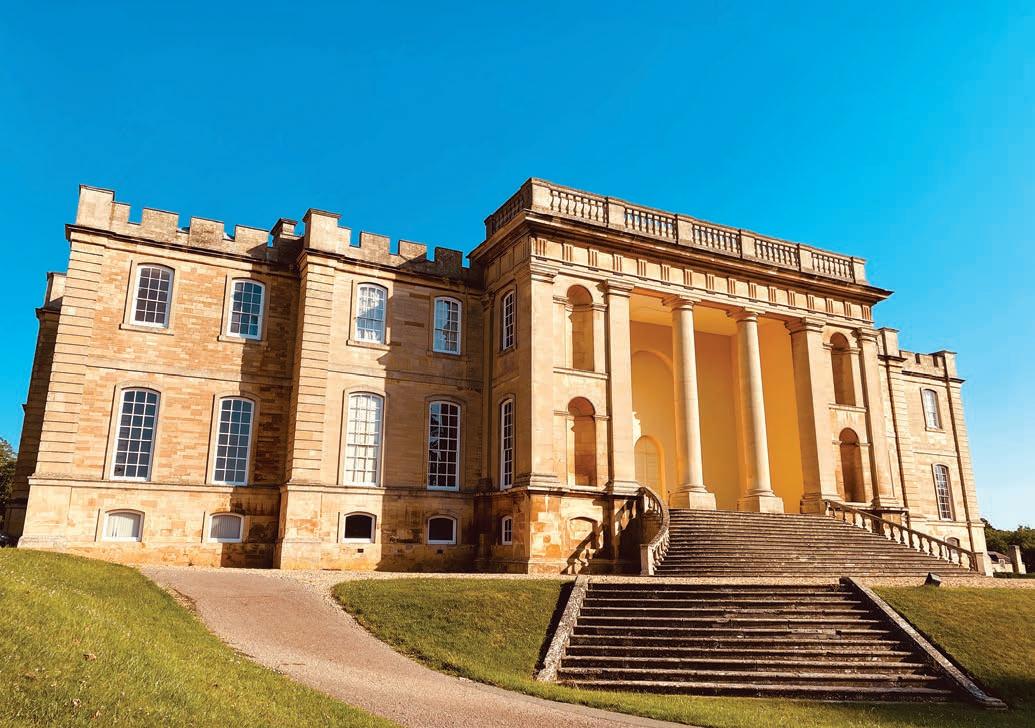
Head: Richard Jones
Location: Blandford, Dorset
USP: Our unique academic system and distinctive culture nurtures purposeful, well-rounded individuals supported by a one-to-one, personal tutor. 80% of students are full boarders in a 24/7 boarding school o ering outstanding arts, sport and academic facilities.
Notable alumni: Lucian Freud, Artist; Frederick Sanger, double Nobel laureate; Phil de Glanville, England Rugby Captain.
Our unique academic system and distinctive culture nurtures purposeful, wellrounded individuals

Head: Mario Di Clemente
Location: Warminster
USP: Bishopstrow College is an international boarding school o ering English language and academic pathway programmes to prepare international students, aged 7-17 years, for entry to leading boarding schools. Students study the National Curriculum at Key Stages 2, 3, and 4, providing excellent linguistic, cultural, academic, and sporting preparation for life at a mainstream boarding school.
Director: Gareth Collier
Location: Cardi and Cambridge
USP: Cardi Sixth Form College has been the top school in the UK over the past 12 years with students going onto leading universities worldwide. 95% of students gained A*-A grades in 2023 and 100% A*-B.The school has also been named in the top three in the world for pastoral care and o ers a wide range of careers and university preparation opportunities. The college o ers a four-year pathway to top universities in its GCSE programme and A levels and has two campuses, Cardi and Cambridge.
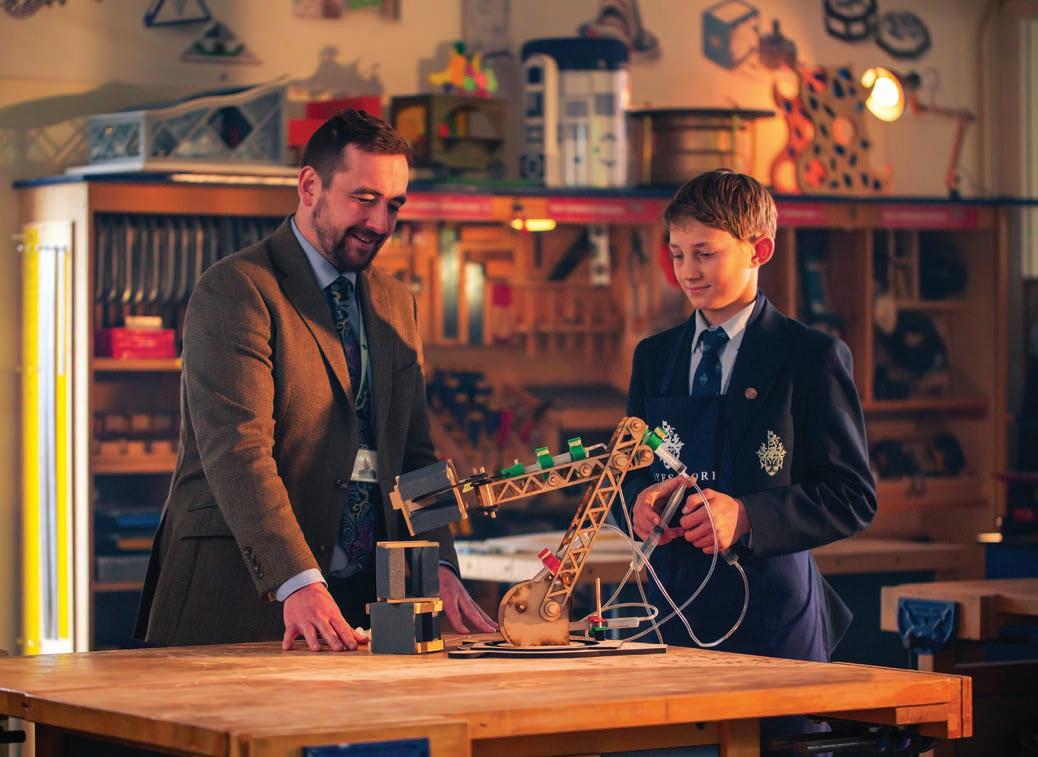

Head: Jo Thomson
Location: Iwerne Minster, Dorset
USP: We are renowned for our warm, family feel but we are ambitious. Clayesmore is often regarded as a warm school with a family feel, but our caring pastoral approach does not compromise academic rigour and the belief that all our pupils should be stretched to achieve beyond their own expectations. All pupils are valued
from the day they join us and they live and grow in a friendly, genuinely open and tolerant atmosphere.
Notable alumni: Dr Gus CaselyHayford, Director of V&A East, Shannon Falcone, Professional Sailor, member of the Luna Rossa team, Tony Hart, Artist & TV presenter, Edward Ardizzone, CBE RA Artist, writer and illustrator, Howard Panter, Theatre impresario, Ambassador Theatre Group, Brian Epstein, manager of The Beatles.
Head: Will Chuter
Location: Kimbolton, Cambridgeshire
USP: Founded in 1600, Kimbolton School is a 4-18 co-educational day and boarding school set in 120 acres of parkland in rural Cambridgeshire. With a family ethos, Kimbolton o ers a balanced education with strong academic results, a full extra-curricular programme and outstanding pastoral care.
Notable alumni: Christopher Curry, founder of Acorn Computers, Louise Brealey, actor, Lord Lancaster of Kimbolton, politician, Ben Saxton, Olympic sailor, Amber de Botton, journalist.
Head: Joanna Wright
Location: Godalming, Surrey
USP: King Edward’s Witley stands out for its rich historic connections, lively international mix of pupils and the deep a ection that pupils and parents feel for the School. Creative thinkers, problem-solvers, social advocates, and independently minded entrepreneurs learn what they are capable of within our peaceful setting in the Surrey Hills. Our aim is to enable each individual’s human flourishing and development of their full potential. Pastoral care is the aspect of education that allows us to become the people we can be.

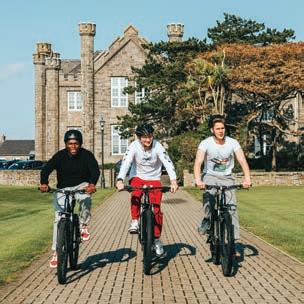
Head: Damian Henderson
Location: Castletown, Isle of Man, IM9 1TP
USP: Established in 1833 and set in the beautiful Isle of Man, King William’s College is a co-educational independent boarding school for ages 11-18. Our pupils follow a broad curriculum including Sport, Drama and Music, taught by dedicated sta . We consistently achieve excellent results and our students attend top universities around the world.
Notable alumni: Sir William Bragg, scientist; John C. Taylor, inventor and Chairman of Strix Ltd.; T.E. Brown, poet and writer; Sir James Haldane Stewart Lockhart
KCMG, Registrar General and Colonial Secretary of Hong Kong; Graihagh Cordwell, University of Oxford lecturer and researcher, Lisa Gunning, film director.
Head: Robert Pavis
Location: Devon, UK
USP: Located on the North Devon coast, Kingsley isn't just an education, it's an adventure. We nurture curious minds with innovative academics, combined with our new Expansive Curriculum, underpinned by our focus on sustainability and environmentalism. Here, learning thrives beyond classrooms, shaping confident, kind leaders of tomorrow.
Notable alumni: George Robinson, entrepreneur.
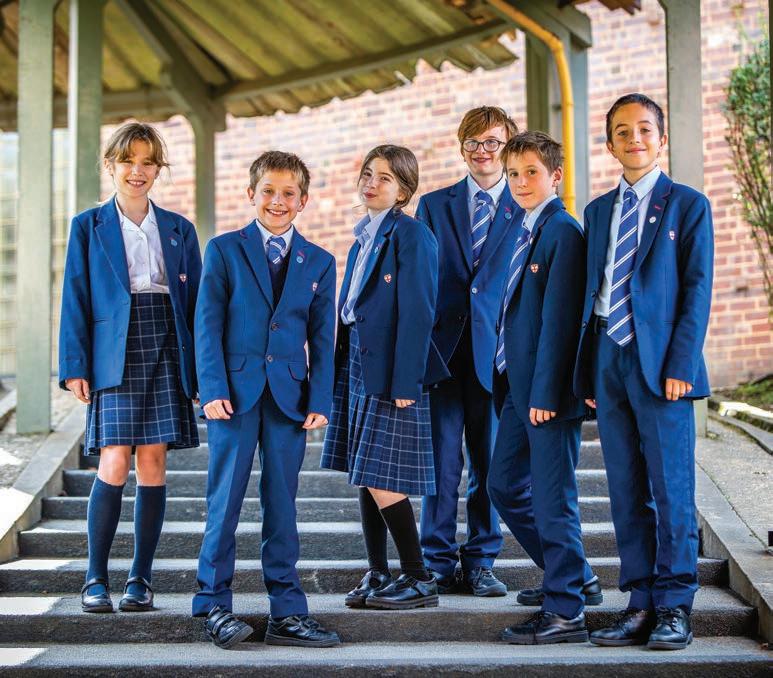
Here, learning thrives beyond classrooms, shaping confident, kind leaders of tomorrow

Head: Crispin Dawson
Location: Reading
USP: Padworth College is an international, co-educational boarding and day school for students aged 14–18 years. The College o ers a broad range of academic programmes to prepare international and British students for entry into top UK universities. The key programmes are I/GCSE programme, A Level programme and NCUK International Foundation Year programme. Since we were established in 1963, we have helped thousands of students achieve excellent academic results.
Interim Head: Adam Carr
Location: Plymouth, Devon
USP: Plymouth College, renowned for academic excellence, o ers a dynamic education in a vibrant city setting. Our commitment to holistic development extends to our comprehensive Cocurriuclar and High Performance Swimming Programme. Excellent facilities, expert teachers and coaches, and a focus on individual progress make Plymouth College a hub for academic achievement and a well-rounded education.
Notable alumni: Ruta Meilutyte, Olympic Gold medalist swimmer; Henry Slade,English Rugby Union Player; Tom Daley, Olympic Diver.

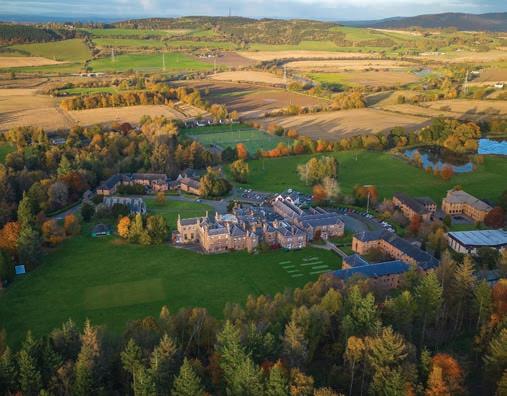
part of Inspired Learning Group
Head: James Nichols
Location: Letchworth Garden City, Hertfordshire SG6 3PJ
USP: St. Francis’ College consistently achieves excellent examination results and is positioned as one of the UK’s top boarding schools for girls. The School is proud that it is a community which values the unique qualities of each of the 330 pupils. Our boarding has a strong family atmosphere with around 50 boarders supported byexperienced boarding sta including academic tutors.
Notable alumni: Dr Nicola Fox, Director of Heliophysics, NASA, Jennie Bond, BBC Royal Correspondent, Dr Adenike Grange, Professor of Paediatrics, Former Minister of Health.
Head: Benson Ferrari
Location: Wales, United Kingdom
USP: St. Michael’s School is one of the UK’s leading independent schools, consistently highly ranked yet remaining inclusive and committed to our mission of success for all students who join us. We o er an outstanding education, combining the pursuit of academic excellence with all-round personal development, for boys and girls aged 3-18 years. We are extremely pleased to announce another year of outstanding A-Level results with 79% of all grades A* or A. Notable alumni: Robert Buckland MP, politician, former Lord Chancellor, Ivor Richard, politician and diplomat, British Ambassador to the United Nations.
The School is proud that it is a community which values the unique qualities of each of the 330 pupils

Head: Mark Lauder
Location: Forgandenny, Scotland
USP: Game-changing education for over a century. Our globally renowned curriculum and diverse cocurricular activities cultivate hidden talents and character. Learning extends beyond classrooms, with extensive sports, arts, academics, and global projects. Encouraging exploration and critical engagement, we nurture lifelong learners, fostering creativity and adaptability for an ever-evolving world.
Notable alumni: Duncan Scott, MBE, Great Britian’s most decorated swimmer at a single Olympic Games, JJ Chalmers, TV & Radio Presenter, Former Royal Marines Commando - Wounded in Afghanistan & Invictus Games Medalist, Jamie Ritchie, Scottish Rugby Captain & Edinburgh Rugby Player, Ciara Elwis, EMMY-Award Winning Music Supervisor, Charlie Guest, Scottish World Cup alpine ski racer, Andrew Scott, CEO of Orbital Marine Power - an innovative Scottish engineering company focused on the development of a low-cost, predictable, scalable floating tidal energy.
Head: James Thomas
Location: Maidstone, Kent
USP: Sutton Valence School is a co-educational day and boarding school for pupils aged 2-18, set in the heart of the Kent countryside. The School o ers outstanding academic tuition in a nurturing, community-focused environment. It has a vibrant boarding community, enjoying the benefit of rural living, but with easy access to London.
Notable alumni: Sydney Wooderson, Ben Brown, Terence Cuneo, Robert Fisk, Ashley Jackson, Susannah Townsend.
Head: Dr L Shaw
Location: Milton Keynes, Buckinghamshire
USP: Thornton College is an awardwinning leading independent day and boarding school for girls ages 3 - 18 years. We are a community where girls thrive; where an outstanding pastoral care and a wonderfully creative and broad curriculum and co-curriculum enables each girl to become the very best version of herself.
Notable alumni: Soprano, Emily Haig, Girls Aloud popstar Sarah Harding, Comedian Ava Vidal.
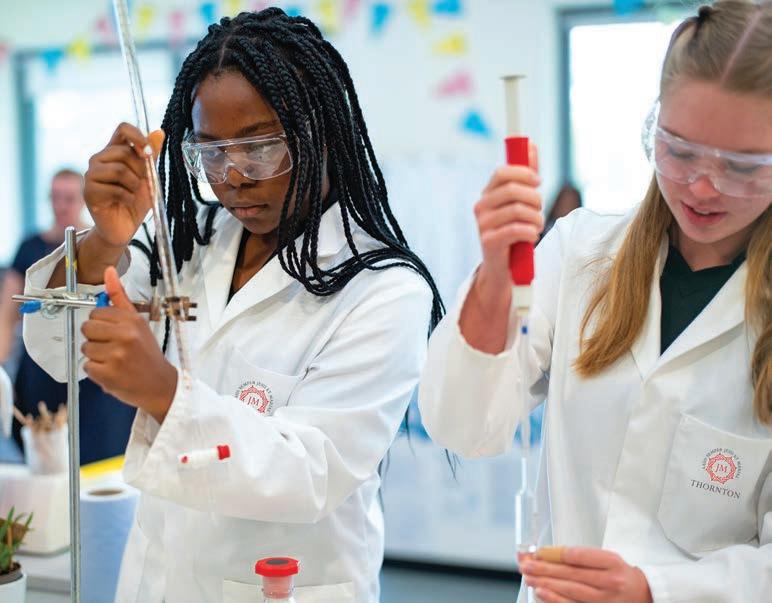

We nurture lifelong learners, fostering creativity and adaptability for an ever-evolving world

Head: Phillip Stapleton
Location: North Devon
USP: Founded in 1858, West Buckland School, situated in 90 acres of North Devon, blends academic excellence with a rich Character Education programme. The school boasts a high university placement rate, particularly in prestigious Russell Group institutions. Outstanding Art and Design facilities, global student diversity, and a vibrant extracurricular life define our dynamic community. Boarding houses led by caring houseparents foster a warm, supportive environment for students to excel. Our pupils develop as balanced, accomplished individuals who can make a di erence.









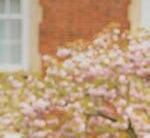


Outstandingco-educational Boardingexperience
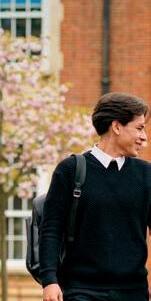



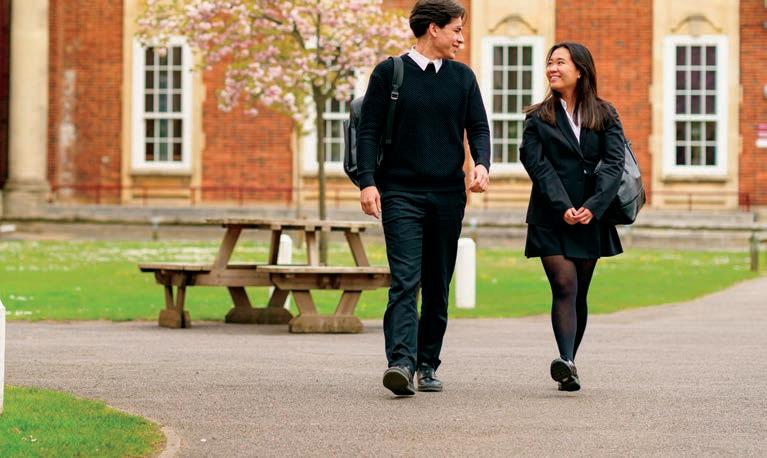
Beautiful110-acreparklandcampus,just30minutesfromCentralLondon andconvenientforLondon’sairports.
ToaccesstheBoardingprospectus,pleasescantheQRcode.
CoombeLane,SouthCroydon,CR95BX royalrussell.co.uk


Visit website
Arrange a visit: admissions@tonbridge-school.org tonbridge-school.co.uk
Tonbridge, founded in 1553, is one of the country’s ancient schools. And yet, despite its age, it is at the forefront of the new. We were the first school in the UK to embed Mindfulness into the curriculum, and our Life Skills course ranges from global perspectives and interview techniques to first aid and yoga. We believe this is innovation with purpose.
Ranked 8th best independent senior school in the country: Sunday Times Parent Power League Table
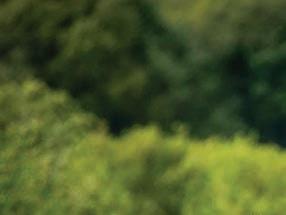
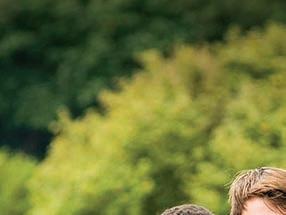







Head: Natasha Dangerfield
Location: Tetbury, Gloucestershire, UK
USP: An inspired day and boarding community, set in a mansion and 210 acres. With a flexible curriculum, strong EAL department, wide co-curricular programme and good achievement, university destinations
included Oxford and Edinburgh. Success is celebrated and talent nurtured; the ethos is greenhouse, not hothouse. Winner of 2023 ‘Coeducational Independent School of the Year’ (Independent School Parent)
Notable alumni: Patsy Toh (pianist); Georgia Byng (author); and Baroness Garden (Speaker, House of Lords).
Success
celebrated and talent nurtured; the ethos is greenhouse, not hothouse
Head: Michael Hall
Location: Ashford, Kent
Founder/Co-Principal: David Game
Location: Tower Hill, London
Head: Julian Noad
Location: Taunton, Somerset
Head: Jeremy Quartermain
Location: Fleetwood, Lancashire
Warminster School
Head: Matt Williams
Location: Warminster, Wiltshire
Warminster School
Head: Matt Williams
Location: Warminster, Wiltshire
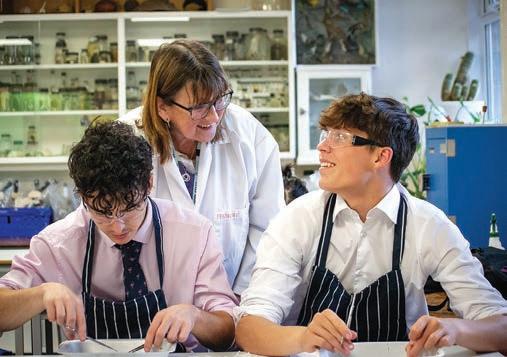 ST MICHAEL'S SCHOOL
WEST BUCKLAND SCHOOL
ST MICHAEL'S SCHOOL
WEST BUCKLAND SCHOOL
60
seconds with
The Headmaster of Claremont Fan Court School, Surrey on his background and educational philosophy
What is your background?
I joined Claremont from King’s College School, Wimbledon, where I had most recently been senior deputy head. I attended King’s as a child, but it was the opportunity to evolve the school that inspired me there; I was head of sixth form when we first admitted girls and academic deputy when we re-introduced A levels. Prior to that I taught at Whitgift.
What excites you most about your role at Claremont Fan Court School?
It is truly empowering to lead a school, and I feel so proud of the pupils here. The governors of Claremont recognised the school needed to evolve, and there have been so many opportunities to build upon what makes us so great. We have a dynamic and genuinely co-educational learning environment, small class and tutor group sizes but mediumsized year groups to ensure our sporting teams are exciting and our curriculum is broad. I love being able to shape Claremont to be something di erent and exciting.
What is your academic philosophy?
Last year’s A level results saw us placed 79th in the country, but I don’t believe in setting an arbitrary hurdle for joining the sixth form. Instead, I believe in challenging pupils to be the very best they can be, setting ambitious standards but as a carrot, not a stick. A learning environment where you are confident in seeking extra support and unafraid to select subjects that motivate you is key to this.
Can you tell us about one pivotal moment in your career?
I was a locally elected councillor until 2010, and I had planned to pursue a political career when I first joined King’s, but the arrival of the new headmaster, Andrew Halls (now a Claremont governor), made me realise what an exciting opportunity leadership of schools o ers to genuinely make a di erence to the lives of others. He empowered me to improve so many of the opportunities we o ered there and gave me the understanding I have today – never being afraid to ask the pupils what we could do better and never losing sight of an integrity for standards.

What is Claremont’s approach and what sets it apart?
We are a more gently selective school than our London neighbours. When combined with the fact that we are co-educational from the age of two, and we are blessed with 100 acres of land within the M25, it means we can o er huge choice of what to study – over 30 sixth form subjects alone. Yes, every year we have seen pupils gaining places at medical school, in computing, economics and science, but you can also use this as a launchpad to film making and fashion design. We believe in o ering inspiring choices alongside nurturing teaching and ambitious support for our pupils’ learning journeys.
What makes a great student?
Until you have had the opportunity to develop new skills, interests, ways of learning,
how can you possibly know what is right for you? A great student is always willing to have a go. They support their peers and are unafraid to work outside their comfort zone. They learn from their experience, are never afraid to have another try, and they are ambitious to succeed, rather than knocked back by failures along the way.
What makes a great school?
A supportive school where you can be you. Neither too big, nor too small. Ambitious but open minded. Driven to achieve but not dogged by data. A school where the rules are understood, so that pupils can feel secure, but where the choices are broad and work for you. A school where you have freedom but also where you are not lost. A school that knows and understands you but has the breadth to enable you to bloom.
“Until you have had the opportunity to develop new skills, interests, ways of learning, how can you possibly know what is right for you?”



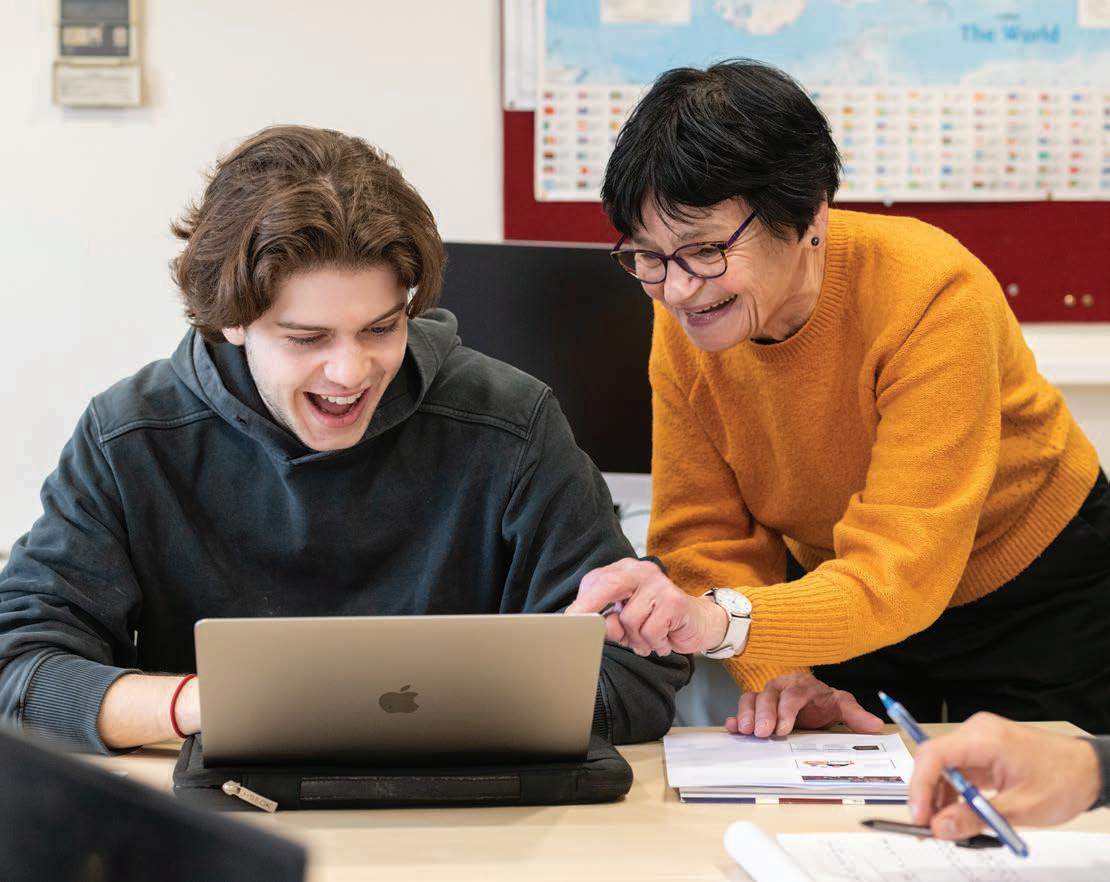
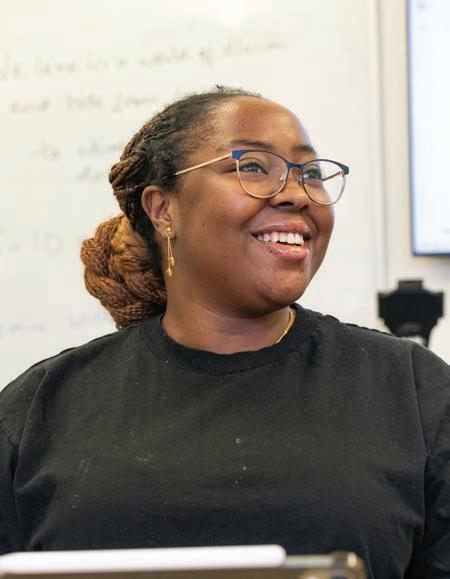
Colleges in London, Birmingham and Cambridge
A level, GCSE, University Foundation
Great university progression
1:1 support tuition
70% UK students / 30% International
Boarding facilities within walking distance
MPW allows you to excel both academically and personally. Pastoral support coupled with personalised lessons and the continuous assistance from all members of sta have made my experience extraordinary and have shaped my future in the best way possible!
Polina (MPW London) achieved A*A*A*A* at A level. Now reading Accounting and Finance at King’s College.